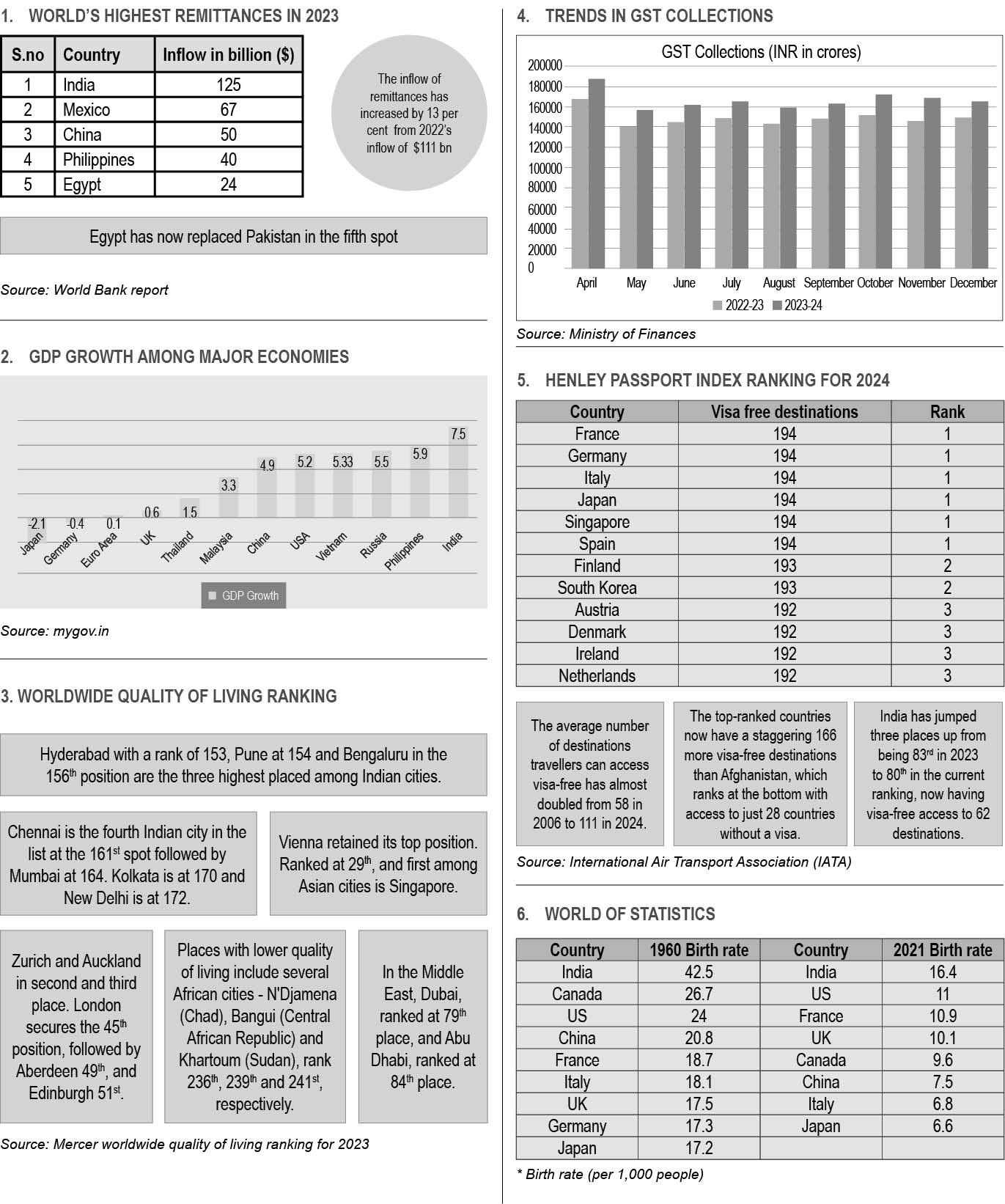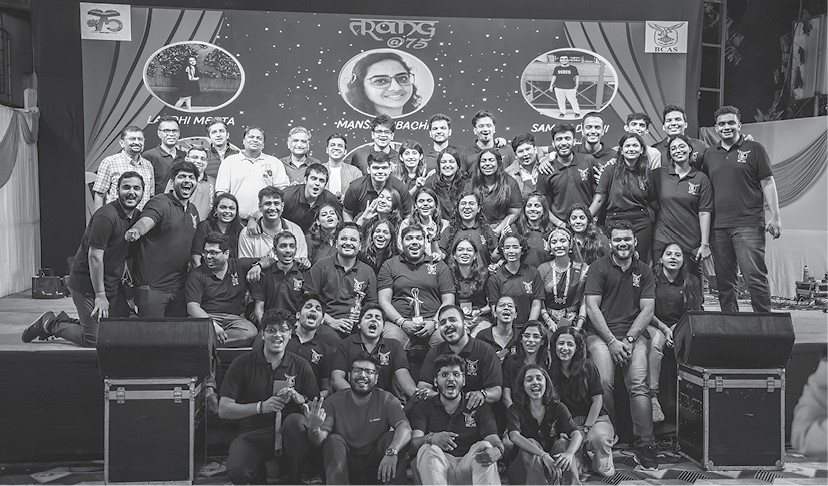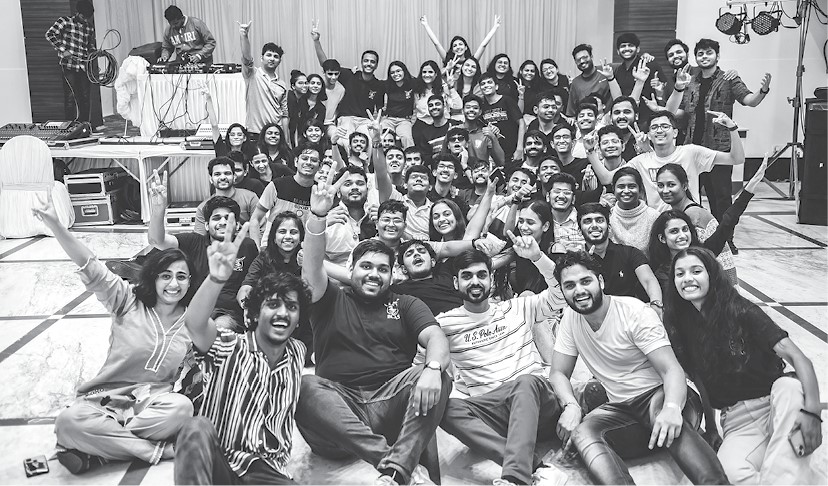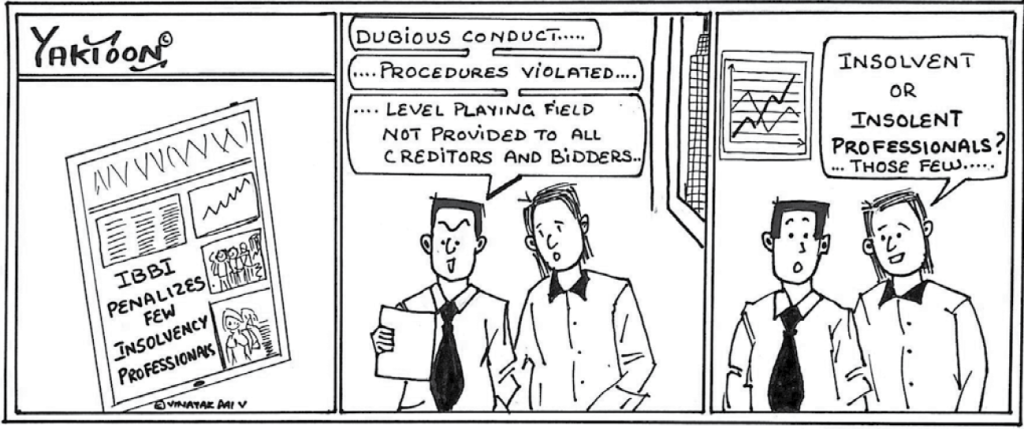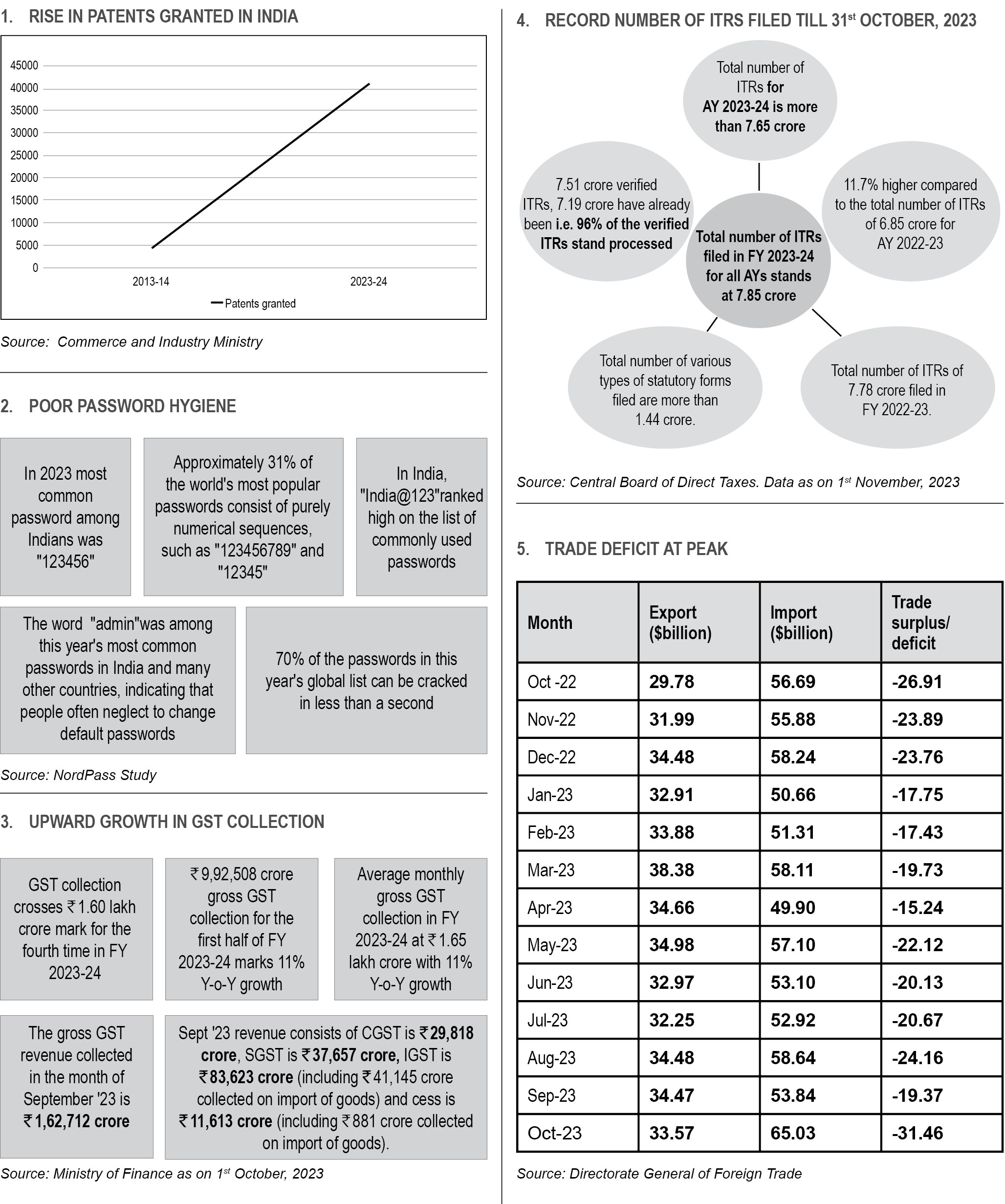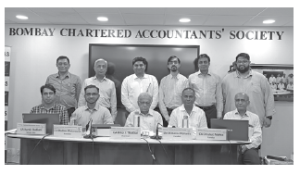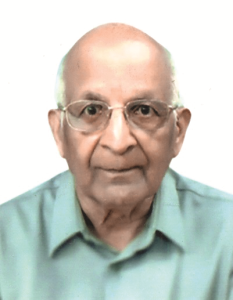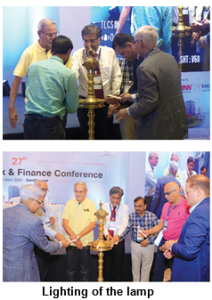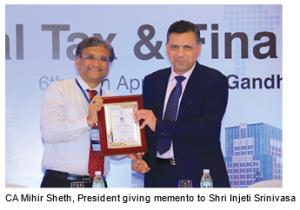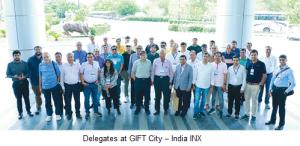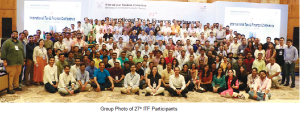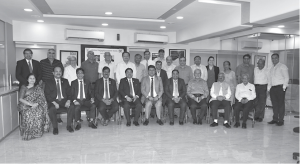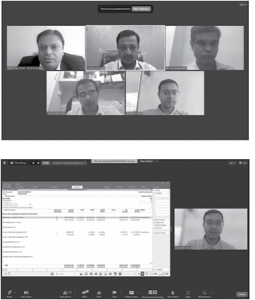Study Circle on “International Economics” held on 30th May, 2016
1. BCAS – International Economic Study Circle had taken up the following subject for discussion: “How the Prime Minister’s dreams can assure 12% GDP growth for the next 20 years”. Mr. Rashmin Sanghvi, Member, made a presentation on the subject on 30th May, 2016. The speaker explained to the meeting that the PM had not made any claim about GDP growth. If however the dreams he had about the country were fulfilled, then in the speakers opinion India would achieve a GDP growth of 12%.
2. The presentation was circulated in advance to the members. In brief, he explained as under:
3. Prime Minister has more than 16 different dreams. These dreams are listed below:
Dream Projects: (1) House for every family by year 2022; (2) Toilets for every house; (3) Road Network; (4) River linking Projects; (5) Sea-coast Transport; (6) Employment for everyone; (7) Bringing Indian residents’ foreign wealth into India; (8) Smart Cities; (9) Infrastructure; (10) Digital India; (11) Mobile Banking; (12) Aadhaar – Related Banking; (13) Direct subsidies to Beneficiary; (14) Financial Inclusion; (15) Electricity for all; (16) Start-up India.
Mr. Sanghvi showed detailed calculations of how the execution of this dream can boost Indian GDP tremendously. At this stage, he clarified: “I am not a politician. I am neither a supporter/fan nor a critic of any politician. This analysis is a pure analysis by an accountant.”
4. The core themes are as under:
4.1 GDP Growth means increase in GDP :
India has half the population that does not get proper food, clothing, housing, education and medical services. Providing these to the people of India means – someone has to spend money. One person’s expenditure is another person’s revenue. As a nation, it is GDP.
4.2 Every expenditure by Government is Revenue for someone. The Revenue will attract, Excise & Sales Tax. Net profit in the revenue will attract income-tax. When money is created, there are multiplier effects.
4.3 India is blessed by nature. We have enough resources to provide for the whole population and more. We have resources. We have needs. Now what prevents us from matching the two? Need is converted into demand when the needy person has income to buy.
4.4 If we use all domestic resources and provide necessities for the whole country, for the next twenty years, we can have a continuous GDP growth @ 12% or more. In this presentation, only attempt is to show that India can continuously grow for next twenty years. Attempt is not to praise or criticize Government plans but to see if a practical way emerges for India’s growth.
4.5 Housing – Paradox.
Today, crores of people are without houses. And simultaneously, housing sector is in recession. Lakhs of flats are lying vacant, unsold, unleased. This is classic case of unbalanced market. Problem is, the builders want to build luxury and super luxury houses. They are not interested in low cost housing for the poor. And the cartel of Builders-Politicians and Bureaucrats has artificially jacked up the prices beyond the reach of the buyer.
5. The Study Circle considered following statistics:
5.1 As per census report of the year 2011, India’s population in the year 2011 was 121 crores. This population is growing annually at 1.82%.
The present homeless figure of 65 crore will grow @ 1.85% in the year 2022 to 80 crores., requiring 16 crore houses, which will be 2.66 crore houses per year, which will translate into a construction cost of Rs.9 trillion per year considering a house of 270 sq feet per household. Comparing the additional house construction of Rs. 9 trillion –with the present GDP of Rs. 134 trillion – there will be an additional growth in the GDP of 6.7%.
5.2 Construction Material:
Construction of houses requires additional production of cement & steel. At present, due to recession, many steel & cement plants are running far below their capacity. They are incurring losses. A substantial amount of increased production can come from better utilization of existing capacities. However, additional construction of require additional installation of capacities for cement & steel.
These two commodities are taken as an illustration. For a house construction, many other things are also required.
5.3 Transport:
This additional material will also require massive transport through railways & roadways. It will require fuller utilization of wagon manufacturing & truck manufacturing. We will also need to install additional capacities for manufacture of wagons & trucks, for laying railway lines and so on.
With detailed calculations, Mr. Sanghvi explained the multiplier effect of a single dream translating into massive economic expansion. When 16 dreams are attempted together, imagine the massive expansion possible.
This figure of Rs. 9 trillion additional GDP comes from only part of the first dream. That is enough to cause 6% GDP growth. When 16 dreams are taken together, there can be 12% GDP growth.
In fact, Central Government total budget including budgetary deficits is Rs. 16 trillion. Hence nobody can expect Government to spend Rs. 9 trillion on single dream. Forget total spending of 16 dreams.
The factor beyond accountancy & economics is that: when someone has dream to serve the society at large, and then does more than his best, help comes from unknown, unexpected sources and work gets done. Or, one can say that God Helps. And the dreamer goes beyond his dreams.
So far, no one in India had the courage to dream. This PM has several dreams. This itself is very important.
7. Revenue:
Increased GDP means increased incomes in the hands of the people and increased income-tax revenue for the Government. Increased production of steel, cement, etc. and sale of houses mean -increased excise and sales tax revenue – for the Government of India. By one estimate, out of the total GDP, Government gets 15% as tax revenue. To this extent, first year’s increased expenditure finances second year’s revenue.
8. Capital:
India is considered a capital deficient country. We need substantial import of capital. Present policy of Government of India & Reserve Bank of India encouraging depreciation of Indian rupee is causing substantial losses to the foreign investor. Both – GOI & RBI together must adopt a policy of stabilizing the rupee & causing annually 1% to 2% of appreciation of Indian rupee. Such a policy can cause massive inflow of capital into India. With such dreams the Indian economy can create a situation of sustained high growth in the economy, stabilization & appreciation of Indian rupee; and overall gross domestic happiness.
The study circle meeting concluded on a note of optimism.
Workshop on “Practice Management & Technology” held on 18th June 2016
CA Raman Jokhakar, President BCAS welcomed the participants. CA Nitin Shingala gave opening remarks for the workshop. CA Ameet Patel set the tone by highlighting relevance of the topic, need and concerns to be addressed on practice management in the changing era of time – realignment of human capital, a paradigm shift in the profession from auditing and tax practice to specialized service providers and niche services. He emphasized on the need to overcome the restraints, hindrances and obstacles and using technology to the advantage of the profession.
Session-1: Running a Niche PSF
Mr. Nishith Desai provided valuable insights on settingup and managing a professional firm. His concept of operating a ‘Nano Firm – Small Size, Big Impact’ was an exceptional element of his presentation. His session enabled participants to have one-on-one interaction with Mr. Desai and learn from the vast pool of experience he has to offer.
Session-2: Running a Niche PSF
Ms. Nita Menezes through the journey of their organization, explained how to deliver services to clients by emphasizing on risk reduction of clients and not only higher returns. She also explained the approach adopted by the organization – Plan, Process and Develop Product, deliver services for successful functioning and client satisfaction. She explained practical insights for SME firms to start, build and keep the firm aligned for growth.
Session-3 & 4: Aligning Human Capital
CA Vaibhav Manek explained the importance of aligning a firm’s human capital and the benefits derived thereof. He touched upon topics like partner revenues, employee attritions, utilizing individual’s strength to firm’s benefit, employee evaluation, compensation and benefits. .
This helped the participants to gain insights and better understanding on need to realign human capital, commanding higher fees and developing higher per partner revenues, niche practice development for concentrated efforts of specializing in service areas, consolidation of firms and its operations to become full service firms with partners focusing on specific service areas and sub-service areas.
Session-5: Tools for Practice Management
Mr. Debajit Roy explained the concept of iFirm, a tool for practice management and how it can be used to enhance firm’s practice in terms of technology, time and turnover.
Session-6: Technology for CA Firms
CA Rajeev Sharma touched upon IT enabled business trends for decades ahead and opportunities that can get generated due to technological developments; need to have cloud based/ semi cloud based outsourcing service. He took up few survey analysis reports and projections on advancements in technology, profession and services.
He also emphasized on tools for practice management in SME sector, Client Relationship Management Software for professional firms.
Session-7: Panel Discussion
CA Nandita Parekh, CA Ameet Patel & CA Nitin Shingala took up the panel discussion round for the participants where various topics and issues faced by practicing professional firms were addressed – How to grow and partner in a firm, challenges and opportunities of collaborating, taking new partners and expanding, necessity for defining strategy for professional firms, passing on leadership and retirement, to have compliance driven practices, use of technological advancements for better servicing of client requirements.
The overwhelming response from diverse spectrum of participants – practice, local and out station participants, BCAS members and Non-members showcased the interest in the subject cutting across wide spectrum of stakeholders. The workshop was attended by 95 participants.
CA Kinjal Shah proposed vote of thanks to all the speakers and participants for making this workshop a grand success.
Lecture Meeting on “Insolvency & Bankruptcy Code, 2016-Boost to ease of doing Business” held on 22nd June, 2016
A lecture meeting on “Insolvency & Bankruptcy Code, 2016-Boost to ease of doing Business” was held on 22nd June, 2016 at BCAS office which was addressed by Mr R K Bansal, Executive Director, IDBI Bank Limited. Mr Bansal explained about the meaning, importance and relevance of Bankruptcy Law in the present scenario.

He also deliberated upon the present procedure of Bankruptcy Law and told that before a company goes into liquidation, the debtors and creditors follow a complex procedure which involves the following:
a) JLF/CDR
b) SDR
c) SARFAESI
d) DRT
e) BIFR
f) Winding Up
In the present scenario, creditors extend the funding, restructure the debt but the entire process to achieve turnaround is solely dependent on the capability of the present promoters except in case of SDR where lenders search for a new promoter for the company.
He discussed about the measures to take the commitment from defaulting promoters i.e. marking the accounts as Special Mention Accounts (SMA and SMA2) where bankers form a joint lender forum with revival plan for Promoters who are unable to repay the debts, through restructuring of NPAs
He also enlightened about the proposed procedure to file a bankruptcy application with NCLT ( National Company Law Tribunal ) or DRT ( in case of Firms and Individuals).
He further mentioned that one of the fundamental features of the Bankruptcy Code is that it allows creditors to assess the viability of a debtor as a business decision, and agree upon a plan for its revival or a speedy liquidation. The Code creates a new institutional framework, consisting of a regulator, insolvency professionals, information utilities and adjudicatory mechanisms that will facilitate a formal and time bound insolvency resolution process (1st stage of Bankruptcy) and liquidation (2nd stage of Bankruptcy). When insolvency process fails, the liquidation procedure comes into force where the assets of the debtor (including the proceeds of liquidation) vest in the liquidation estate. A total of 50 participants attended the meeting
The meeting concluded with a formal vote of thanks by Mr K K Jhunjhunwala
Overall the lecture was very informative and well appreciated by the Audience.
10th Residential Study Course on Service Tax & VAT held on 24th June, 2016 to 26th June, 2016 at Lavasa
The Indirect Taxation Committee (IDTC) of BCAS successfully conducted the 10th Residential Study Course on Service Tax & VAT , at Hotel Mercure and International Convention Centre at Lavasa, from 24th June 2016 to 26th June 2016.
This series of Residential Study Courses (RSC), which is fully devoted to the studies of indirect taxes, is becoming more and more popular among the members of BCAS. . The venue, Lavasa, located about 65 kms. from Pune, at a height of about 2100 ft. amidst the Shayadri Mountains, and the monsoon rains gave the perfect blend of nature and atmosphere for focused studies and fellowship.
A new feature, added this year, i.e. the concept of ‘group mentors’ received kudos from all the participants. The group discussions reached a high level of maturity and the knowledge sharing could become much more meaningful. The five ‘group mentors’ namely CA Ashit Shah, CA Bharat Shemlani, CA Naresh Sheth, CA Rajiv Luthia and CA Udayan Choksi provided valuable guidance to all the groups throughout the program.
Day 1 – 24th June, 2016
 The RSC started in the afternoon with group discussion on the paper titled “Case Studies on Taxation of Services” written by CA A. R. Krishnan. The group leaders were CA Ankit Joshi, CA Anil Kumar Beewada, CA Mandar Telang, CA Manindar Kakarla and CA Nilesh Suchak. Case Studies on taxability of different services and various “live” situations faced by tax advisers on daily basis were articulated. Valuation, Exemption, Point of Taxation and Place of Provision of Service were debated with active participation of all the delegates.
The RSC started in the afternoon with group discussion on the paper titled “Case Studies on Taxation of Services” written by CA A. R. Krishnan. The group leaders were CA Ankit Joshi, CA Anil Kumar Beewada, CA Mandar Telang, CA Manindar Kakarla and CA Nilesh Suchak. Case Studies on taxability of different services and various “live” situations faced by tax advisers on daily basis were articulated. Valuation, Exemption, Point of Taxation and Place of Provision of Service were debated with active participation of all the delegates.
This was followed by the Inauguration Session – lighting of the lamp at the hands of CA Dilip Sheth, a very senior member of the BCAS, President CA Raman Jokhakar and the Chairman of the Indirect Taxes Committee – CA Govind Goyal. The lighting of the lamp was followed by a brief key note address by CA Dilip Sheth.
Inaugural session was immediately followed by the first technical session wherein CA A. R. Krishnan (the mentor of IDTC) gave his views on the case studies in his paper and also replied to other related issues raised during the group discussion. His masterly analysis of various provisions of law and his guidance to participants on “thought process and the reasoning that should go while arriving at a conclusion’” will always be remembered by all those who participated in this RSC. The session was chaired by the president CA Raman Jokhakar.
Day 2 – 25th June, 2016
 The morning started with the group discussion on the paper “Case Studies on CENVAT Credit” written by CA S. S. Gupta. The group leaders were CA Ganesh Prabhu Balakumar, CA Keval Shah, CA Shreyas Sangoi, CA Shruti Kakaria and CA Vaibhav Jajoo. The issues were debated since most of the issues had a variety of angles involved and had day-today relevance.
The morning started with the group discussion on the paper “Case Studies on CENVAT Credit” written by CA S. S. Gupta. The group leaders were CA Ganesh Prabhu Balakumar, CA Keval Shah, CA Shreyas Sangoi, CA Shruti Kakaria and CA Vaibhav Jajoo. The issues were debated since most of the issues had a variety of angles involved and had day-today relevance.
 The second technical session was a presentation paper by CA Divyesh Lapsiwala on “Indirect Tax Benefits in Foreign Trade Policy”. In his inimitable style, he briefly explained the five most common schemes of the Government’s Foreign Trade Policy which can benefit the exporters i.e. (a) Export Promotion Capital Goods Scheme (b) Services Exports from India Scheme (c) Status Holders (d) Software Technology Park Scheme and (e) Special Economic Zone Scheme. This session was chaired by CA Hasmukh Kamdar.
The second technical session was a presentation paper by CA Divyesh Lapsiwala on “Indirect Tax Benefits in Foreign Trade Policy”. In his inimitable style, he briefly explained the five most common schemes of the Government’s Foreign Trade Policy which can benefit the exporters i.e. (a) Export Promotion Capital Goods Scheme (b) Services Exports from India Scheme (c) Status Holders (d) Software Technology Park Scheme and (e) Special Economic Zone Scheme. This session was chaired by CA Hasmukh Kamdar.
In the third technical session CA S. S. Gupta provided solutions to the issues raised in his paper on case studies on CENVAT Credit. The issues were explained in details and also the new issues that have surfaced due to recent amendments through Finance Act 2016. This session was chaired by CA Uday Sathaye, Past President of BCAS.
The afternoon was free for the participants to explore the hill city of Lavasa, take a walk on the river side promenade and enjoy the wonderful atmosphere. In the evening a musical evening was organized “for the members by the members”. The members here got an opportunity to show case their hidden talents.
Day 3 – 26th June, 2016
 The last paper for Group Discussion was written by by CA Parind Mehta on “Case Studies on Sale v/s Service – Composite Transactions (Taxability under VAT and Service Tax)”. The Group Leaders were CA Chirag Mehta, CA Samir Kapadia, CA Sanjay Dhariwal, CA Vikram Mehta and CA Yash Dhadda. The case studies highlighted certain very relevant issues which a transaction could have and were probably not even envisaged by many participants.
The last paper for Group Discussion was written by by CA Parind Mehta on “Case Studies on Sale v/s Service – Composite Transactions (Taxability under VAT and Service Tax)”. The Group Leaders were CA Chirag Mehta, CA Samir Kapadia, CA Sanjay Dhariwal, CA Vikram Mehta and CA Yash Dhadda. The case studies highlighted certain very relevant issues which a transaction could have and were probably not even envisaged by many participants.
 During the fourth technical session, CA Sagar Shah presented a paper on “Role of CAs in GST – Realignment Requirements”. A very crisp and brief analysis of how as a professional we need to gear up for the challenges as well as opportunities this new law will generate for Chartered Accountants. This session was chaired by CA Sunil Gabhawalla.
During the fourth technical session, CA Sagar Shah presented a paper on “Role of CAs in GST – Realignment Requirements”. A very crisp and brief analysis of how as a professional we need to gear up for the challenges as well as opportunities this new law will generate for Chartered Accountants. This session was chaired by CA Sunil Gabhawalla.
Thereafter, in the fifth and the final technical session, CA Parind Mehta replied to all the queries raised by the participants and also gave his views on the issues raised in the case studies. The reference material provided along with his paper listing out a whole lot of case studies would be a very useful to all the participants. This session was chaired by CA Deepak Thakkar.
The RSC concluded with the Chairman of Indirect Taxes Committee CA Govind Goyal thanking all the paper writers and delegates for their co-operation and active participation, chairmen of technical sessions, the group mentors, the group leaders, all committee members, the BCAS staff, management of the Hotel and the Convention Centre and all others who made this RSC a very successful event. He specially thanked the President CA Raman Jokhakar for his wholehearted support. The President CA Raman Jokhakar thanked the chairman, conveners and all members of IDTC for their untiring efforts to make this RSC a memorable one. A total of 175 participants attended the Study Course.
After lunch, the participants departed to their respective destinations cherishing the memories of the 10th RSC, with a promise to meet again next year at the 11th RSC.
IT STUDY CIRCLE WORKSHOP ON “SUPER ADVANCED EXCEL FOR PROFESSIONALS ’ PART III” HELD ON 28th JUNE, 2016
The Technology Initiatives Study Circle of the BCAS recently held a multi-session workshop on ‘Super Advanced Excel for Professionals’ by the learned speaker CA Nachiket Pendharkar.
Nachiket is a Microsoft certified corporate trainer for MS Excel and Excel VBA. He is the founder & CEO of ViN Learning Centre, a corporate training institute based in Mumbai. Nachiket was shortlisted in the top 30% candidates across the world in the Excel Model Off competition (a global competition on financial modelling using MS Excel) in their 2015 edition.
This was the third session of the series, held on 28th June 2016. The first two sessions were held on 24th May 2016 and 7th June 2016 respectively.
This third session covered unique topics such as Alternatives to nested if, Data Tables – multi variable simulations, ASAP utilities Add in, Table and Table Tools and Array formulae, Advanced features of Pivot Tables.
The session witnessed a large audience which saw good interaction between the speaker and the participants. The speaker answered a lot of queries that were posed by the participants. A total of 30 participants attended the Workshop. All participants have benefited immensely through these enriching sessions.
Lecture Meeting on “Model GST Law” by Shri Shailesh Sheth on 29-6-2016
 BCAS organised a lecture meeting on 29-6-2016 on the Model GST Law at IMC. At a juncture when the fate of the 122nd Constitutional Amendment Bill is yet to be known and everyone is waiting for its passage in this monsoon session of the Parliament, on 14-06-02016, the Model GST Law was placed in the public domain by the government after the nod of the Empowered Committee. Shri Shailesh Sheth gave wonderful insights on the model law. The views of the speaker on the Model GST Law were commendable and a guiding force for all. The speaker in a nutshell described to the members present the various provisions of the model law and how the model law has been drafted as a mixture of the existing indirect tax laws like State Level VAT , Central Excise and Service tax. The meeting received an overwhelming response with the venue packed with around 250 audience.
BCAS organised a lecture meeting on 29-6-2016 on the Model GST Law at IMC. At a juncture when the fate of the 122nd Constitutional Amendment Bill is yet to be known and everyone is waiting for its passage in this monsoon session of the Parliament, on 14-06-02016, the Model GST Law was placed in the public domain by the government after the nod of the Empowered Committee. Shri Shailesh Sheth gave wonderful insights on the model law. The views of the speaker on the Model GST Law were commendable and a guiding force for all. The speaker in a nutshell described to the members present the various provisions of the model law and how the model law has been drafted as a mixture of the existing indirect tax laws like State Level VAT , Central Excise and Service tax. The meeting received an overwhelming response with the venue packed with around 250 audience.
The session ended with a vote of thanks to the speaker by Mr Chirag Mehta
Full day “Seminar on the Finance Act, 2016” with emphasis on Income Declaration Scheme held on 1st July, 2016
The Full day seminar on Finance Act, 2016 was held by the Taxation Committee at BCAS Gulmohar Hall. President Raman Jokhakar gave the opening remarks followed by introductory words from the Chairman of the Taxation Committee, Mr. Sanjeev Pandit.
Various topics were taken up at the Seminar by the following Speakers:
Mr Yogesh Thar: Provisions relating to The Direct Tax Dispute Resolution Scheme, 2016, Equalisation Levy, Residence & Chapter XXBC, Transfer Pricing, Return of income, Advance Tax, Assessment and Intimation u/s 143(1) and Provisions dealing with special rate of tax like 115BA, 115BBDA etc.
 Mr. Yogesh Thar explained the important features of The Direct Tax Dispute Resolution Scheme, 2016 and Equalisation Levy. . He further discussed the provisions related to special rate of tax for certain companies under Section 115BA and Section 115 BBDA dealing with additional 10% tax on dividends in the hands of recipient. He also brought out various issues arising out of the above amendments and answered the queries of the participants.
Mr. Yogesh Thar explained the important features of The Direct Tax Dispute Resolution Scheme, 2016 and Equalisation Levy. . He further discussed the provisions related to special rate of tax for certain companies under Section 115BA and Section 115 BBDA dealing with additional 10% tax on dividends in the hands of recipient. He also brought out various issues arising out of the above amendments and answered the queries of the participants.
Mr Rajesh Kadakia: Amendments related to Charities (with special reference to Chapter XII-EB), Immovable Properties (Sec. 50C), Capital Gains related provisions and Deduction of profits from housing projects of affordable residential units –Sec. 80IBA etc.
 Mr. Rajesh Kadakia started his talk by highlighting the amendments relating to charitable institutions. He explained the intention and rationale behind the said changes and highlighted the effects of the same for the existing charitable institutions and their activities. He gave an insight into the provisions relating to Immovable Properties (Sec. 50C), Capital Gains related provisions and deduction of profits from housing projects of affordable residential units – Sec. 80IBA etc.
Mr. Rajesh Kadakia started his talk by highlighting the amendments relating to charitable institutions. He explained the intention and rationale behind the said changes and highlighted the effects of the same for the existing charitable institutions and their activities. He gave an insight into the provisions relating to Immovable Properties (Sec. 50C), Capital Gains related provisions and deduction of profits from housing projects of affordable residential units – Sec. 80IBA etc.
Mr Praful Poladia: Provisions relating to The Income Declaration Scheme, 2016, Presumptive Taxation and related provisions as to tax audit and maintenance of books of account, buy back of shares.
 Mr. Praful Poladia started with case studies highlighting the amendments to Presumptive Taxation for persons engaged in business and profession and related provisions i.e. tax audit and maintenance of books of account. He also gave detailed examples in relation to amendments to buyback of shares and how it affects business structuring. He explained to the participants the new Income Declaration Scheme, 2016 and took them through three sets of clarifications issued by CBDT on the Scheme.
Mr. Praful Poladia started with case studies highlighting the amendments to Presumptive Taxation for persons engaged in business and profession and related provisions i.e. tax audit and maintenance of books of account. He also gave detailed examples in relation to amendments to buyback of shares and how it affects business structuring. He explained to the participants the new Income Declaration Scheme, 2016 and took them through three sets of clarifications issued by CBDT on the Scheme.
Ms Sonalee Godbole: Amendments in relation to Penalties (with special reference to Sec. 270A), Chapter VI-A deductions, Provisions relating to Income from Business & Profession (other than Presumptive Taxation), Income from Salary, Rules regarding Provident Fund, Income from House Property, TDS provisions.
 Ms. Sonalee Godbole gave a detailed presentation on amendments in relation to penalties (with special reference to sec. 270A), Chapter VI-A deductions, provisions relating to Income from Business & Profession (other than Presumptive Taxation), Income from Salary, Income from House Property and TDS provisions. The speaker touched upon a wide number of judgments during the course of her talk. She also answered all the questions raised by the participants.
Ms. Sonalee Godbole gave a detailed presentation on amendments in relation to penalties (with special reference to sec. 270A), Chapter VI-A deductions, provisions relating to Income from Business & Profession (other than Presumptive Taxation), Income from Salary, Income from House Property and TDS provisions. The speaker touched upon a wide number of judgments during the course of her talk. She also answered all the questions raised by the participants.
 There was also a session on Income Declaration Scheme, 2016 where the Principal CCIT Mr D. S. Saksena along with Pr. CIT – 1 Mr. D.C. Patwari addressed the participants about the features and procedural aspects of the said Scheme. They also answered the queries raised by the participants and were receptive to the clarifications sought by them. They told that the issues where clarifications are necessary would be forwarded to the CBDT for further clarification. They also asked the participants to make their clients aware of the scheme and assured that the details provided by assesse under the scheme would be kept confidential. Mr Patwari also briefly spoke about the Dispute Resolution Scheme, 2016.
There was also a session on Income Declaration Scheme, 2016 where the Principal CCIT Mr D. S. Saksena along with Pr. CIT – 1 Mr. D.C. Patwari addressed the participants about the features and procedural aspects of the said Scheme. They also answered the queries raised by the participants and were receptive to the clarifications sought by them. They told that the issues where clarifications are necessary would be forwarded to the CBDT for further clarification. They also asked the participants to make their clients aware of the scheme and assured that the details provided by assesse under the scheme would be kept confidential. Mr Patwari also briefly spoke about the Dispute Resolution Scheme, 2016.
 The sessions in the Seminar were very interactive and the speakers answered a lot of queries that were received from the participants. The participants benefited immensely with the interactive sessions and detailed discussions with the speakers and Income Tax Department Officials. The event saw attendance by over 100 participants.
The sessions in the Seminar were very interactive and the speakers answered a lot of queries that were received from the participants. The participants benefited immensely with the interactive sessions and detailed discussions with the speakers and Income Tax Department Officials. The event saw attendance by over 100 participants.
68th Founding Day Lecture Meeting on “Achieving Sustainable Profitable Growth on a Perpetual Basis” held on 7th July, 2016
A lecture meeting on Achieving Sustainable Profitable Growth on a Perpetual Basis was held on 7th July, 2016 at Walchand Hirachand Hall, 4th Floor, IMC, Mumbai after Annual General Meeting and Foundation Day of the Society. The meeting was addressed by Mr Harsh Mariwala, renowned industrialist and Chairman of Marico Limited. Through his vision and mission in mind, he is instrumental in maintaining Marico’s business at a sustainable and profitable growth pace.
 He explained that the growth both in business and profession has to result in profits for associates, shareholders and stakeholders. He gave examples as to how he faced the key challenges in achieving and sustaining growth in his company which filters from top to bottom.
He explained that the growth both in business and profession has to result in profits for associates, shareholders and stakeholders. He gave examples as to how he faced the key challenges in achieving and sustaining growth in his company which filters from top to bottom.
 Further, the speaker took through the journey of Marico which was a family run business and how it was modelled to bring about value principles and policies to bring expansion and growth. He talked about his journey of culture building in the organization through involvement of its people and seeking commitment from them. He also emphasized the need of quarter to quarter performance to measure topline and bottomline growth.
Further, the speaker took through the journey of Marico which was a family run business and how it was modelled to bring about value principles and policies to bring expansion and growth. He talked about his journey of culture building in the organization through involvement of its people and seeking commitment from them. He also emphasized the need of quarter to quarter performance to measure topline and bottomline growth.
The lecture was well attended by around 200 participants and got a thunderous applause from the audience. The meeting concluded with a vote of thanks by CA Narayan Pasari, Vice President, BCAS
Study Circle on Simple Techniques of “Yoga to Live Healthy” held on 8th July, 2016
A lecture meeting on Simple Techniques of “Yoga to Live Healthy” was held on 8th July, 2016 at BCAS, 7, Jolly Bhavan No -2, New Marine Lines, Mumbai-400020. The meeting was addressed by CA Dr. Kishore Gada, renowned practising CA since 1998, Convenor of Ghatkopar CA CPE Study Circle and also a Yoga teacher. He has authored 3 thesis on the topic Jainism and Yoga, which remarks his passion and interest for Yoga. Through his vision and mission in mind, he is instrumental in maintaining a proper work life balance with the help of Yoga and conveying this message to maximum people.
He started with a peaceful Yoga prayer and explained the true definition of Yoga that is a state of connection of body and mind. He then explained how various organs and various system of human body are connected to the spinal cord and brain and how wrong body postures while at work, studying, sleeping break the connection of mind and body.
Afterwards he travelled through the journey of meditation, breathing exercises and all practically experienced the power of “OM Mantra” to relieve stress.
Overall, it was a very refreshing and learning experience. Practical and simple techniques through which we can live happily without stress and fear were conveyed in the best possible manner and he got a huge applause from the audience. BCAS President CA Chetan Shah appreciated the efforts taken by renowned speaker and assured this lecture would be conducted at a larger scale for the benefit of the maximum. . The meeting concluded with vote of thanks by Jekin Dedhia, Students study circle in-charge of Bombay Chartered Accountant Society (BCAS).
Full day Workshop on “Heal without Medicines” held on 9th July, 2016
Human Development and Technology Initiatives Committee organized a full day program on “Heal Without Medicines” on Saturday, 9th July, 2016 at Directi-I-Plex, Andheri (East)
Atul Shah is an active propagator of Natural diet. He himself was miraculously cured from a so-called incurable condition called Avascular Necrosis (AVN) that affects the hip joint. When modern medical science could not offer a solution, Atul started reading about this unprocessed natural food diet after being introduced to it through a contact and turned to it as a last resort. It worked wonders for him and he was cured of AVN within a year of rigorously following this diet regimen.
The theme was “to die young and as late as possible, i.e. to live long and live young and always vibrant and bubbling with energy and reverse the ageing process.”
Atul Shah spoke on How to Have Good Health without Medicines?
We learnt how Raw Food Diet can help to Maintain Natural Healthy Life Style.
How to feel at ease and feel calm and Cool at all times by eating the right foods.
He spoke on how raw food diet can make us free from all Diseases and Discomforts.
How Your Food can be Your Medicine.
Little Changes in Your Daily Diet can make a Big Difference to your Life and Health
We can get rid of all types of lifestyle diseases like Joints Pain, Diabetes, Blood pressure,
Acidity, Migraine, Asthma, Kidney Disease, Heart Problems, Skin Diseases and many more…
We also got to know the sharings of people who have restored vibrant health with this NATURAL HEALTHY LIFESTYLE!
We also learnt what can cause harm to health.
Raw food lunch was served to the participants. Also relished the taste of Green Juice.
Members had come with their spouse and family members. It was good to come together to learn and share meal together. A total of 137 participants attended the workshop
Human Development Study Circle Meeting on “Human Engineering” held on 12th July, 2016
Human Development Study Circle Meeting to watch the DVD – Video Talk on “Human Engineering” by Mahatria was held on 12th July, 2016 at BCAS Conference Room. CA Vinod Jain gave a small introduction before the DVD was screened. The talk was so absorbing that it was an undisturbed screening of 90 minutes. The Lessons learnt from this video talk were discussed. The learning from this:
We are designed to be with smile, laughter, tears, compassion and love. We can live our potential life, with our ability to express our emotions. Our “ego” should not come in the way. By loving humans, we love creations of God.
As a nation, we lack one very important quality “Discipline”. Our education system does not teach how to enjoy heterogeneous relationships, deal with failures and communication skills. But we must learn them, since they are important. History should inspire us, telling all legendary figures were born normal but they took up something exceptional and became legendary figures. Same way we have potential to be infinitely greater than what we are today.
We must live a holistic life and balance our physical, mental, intellectual, emotional and spiritual life.
Physical: We must give one hour to our body daily through exercise etc., then body can take our care for next 23 hours. We must push our body little more and eat little less.
Mental: We must take care of our subconscious mind, since it is 7/8th part of total mind. Anything positive, we must speak in 5 sentences and get emotionally involved. Anything negative, we should finish it in one sentence and analysis it intellectually. Any one joining our organization to be celebrated and someone leaving should just be analyzed.
Intellectual: Sub-ordinate your likes and dislikes to your purpose of life. Otherwise, you will subordinate your purpose of life, to your likes and dislikes. Ordinary people when they identify themselves with a cause larger than themselves, they would unfold legendary possibilities in their life.
Emotional: When something goes wrong or we see wrong happening around us, we generally crib. Instead of cribbing and doing nothing, we need to channelize our emotions for a higher purpose and make thing better in this world e.g. Gandhi channelized his emotions to free India from British.
Spiritual: Our spirits are like power house, unless we are charged up internally, we cannot perform. We transcend in our life and get energy from universe, where we lose sense of time and space, be it creating something, meditating, caring, listening music, sharing, playing etc.
The participants were interested in more such video screenings for Study Circle Meetings.
Lecture Meeting on “Tax Issues in Business Re-organisation-LLP / Companies” held on 13th July, 2016
 Lecture Meeting on Tax Issues in Business Re-organisation- LLP / Companies by Shri Pinakin Desai was held at IMC. President Chetan Shah gave the opening remarks.
Lecture Meeting on Tax Issues in Business Re-organisation- LLP / Companies by Shri Pinakin Desai was held at IMC. President Chetan Shah gave the opening remarks.
Mr. Desai explained the meaning of reorganisation and touched upon various areas under the Income-tax Act, 1961 that would have to be examined in a business reorganising scenario.
The various concepts were explained with the help of case studies that enabled the participants to understand the issues with ample clarity.
Mr. Desai touched upon the following aspects in course of his presentation:
(a) Section 115BA in the context of a manufacturing company undergoing a demerger / slump sale
(b) Carry forward of losses in case of conversion of firm to LLP
(c) Demerger of company, conversion of company into LLP and subsequent withdrawal from LLP
(d) Merger and subsequent conversion into LLP
(e) Demerger between unrelated parties including accounting for demerger in the books of Demerged company and the resultant company in the light of Ind-AS
(f) Merger of companies under Court Scheme with reference to General Anti Avoidance Rules (GAAR) prescribed under the Income-tax Act, 1961 which are yet to become effective
(g) Share acquisition followed by Capital reduction and merger
(h) Business reorganization in light of sections 92B(1) and 92B(2)
(i) Indirect transfer of assets including tax neutrality to the foreign amalgamating company, Indirect transfer mitigation amongst others
(j) Real Estate Investment Trust – where SPV is a company and where SPV is an LLP
(k) Tax neutrality of demerger – where consideration is discharged by (i) parent company (ii) foreign parent of transferee company
Mr. Desai also elaborated on evaluating the impact of GAAR grandfathering under various scenarios such as rights issue, bonus issue, etc
It was a very informative and insightful learning experience for all the participants present. The event saw attendance by over 400 participants. The session ended with vote of thanks by Ms Pooja Punjabi.
Direct Tax Study Circle Meeting on “Issues relating to Dispute Resolution Scheme, 2016” & the Income Declaration Scheme, 2016 held on 14th July 2016
The Group leader, CA Devendra Jain commenced the meeting by commenting upon the intention of the Government behind introduction of Dispute Resolution Scheme 2016, which is to reduce the pendency of litigation existing as on 29th February 2016. He explained the provisions of the Scheme in brief and pointed out the persons who can avail this Scheme.
He gave a hypothetical example wherein the assessment order u/s 143(3) was passed before 29th February 2016 and the time limit for preferring an appeal against this order has not lapsed by this date. Then in such a case, there could be a question of availability of this Scheme since the appeal is not pending on 29th February 2016 but the assessee has got time to file the appeal; hence a clarification is required for such cases.
Thereafter, he touched upon the provisions of the Income Declaration Scheme 2016 and the valuation methods prescribed under the Rules. He pointed out the various FAQ’s released by the CBDT in relation to this Scheme and the far reaching implications of the same. He mentioned that as per the Circular No. 27/2016, provisions of this Scheme [section 197(c)] would override section 148 of the Income Tax Act, 1961 and there could be questions on the constitutional validity of such a provision. At the end, various issues which one could face while implementing this Scheme were discussed by the Group. A total of 30 participants attended the Study Circle.
Workshop on Maharashtra VAT & CST Held on 16th July 2016
 The Indirect Taxation Committee (IDTC) of BCAS organized a Workshop on Maharashtra VAT and CST, wherein two important subjects were discussed i.e. (1) “Preparation and filing of returns under the new automation process” and (2) “Maharashtra Settlement of Arrears in Dispute Scheme, 2016”. It was held on Saturday 16 July 2016, at the Conference Hall of BCAS.
The Indirect Taxation Committee (IDTC) of BCAS organized a Workshop on Maharashtra VAT and CST, wherein two important subjects were discussed i.e. (1) “Preparation and filing of returns under the new automation process” and (2) “Maharashtra Settlement of Arrears in Dispute Scheme, 2016”. It was held on Saturday 16 July 2016, at the Conference Hall of BCAS.
Shri Rajiv Jalota (Commissioner of Sales Tax – State of Maharashtra) was the Chief Guest, Mr. Nitin Shaligram (Dy. Commissioner of Sales tax, Mumbai) and members of his team, and, Mr. A S Gorde (Dy. Commissioner of Sales tax, Mumbai) were the speakers for the day.
 CA. Chetan Shah (President, BCAS) welcomed the participants and highlighted the relevance of the topic in view of the proposed ‘automation process’ and expected implementation of the GST in April 2017. CA. Govind Goyal (Chairman IDTC) briefly introduced the speakers and topics allocated to each speaker for discussion. Thereafter, the speakers were felicitated by the CA. Deepak Shah, (Co- Chairman IDTC).
CA. Chetan Shah (President, BCAS) welcomed the participants and highlighted the relevance of the topic in view of the proposed ‘automation process’ and expected implementation of the GST in April 2017. CA. Govind Goyal (Chairman IDTC) briefly introduced the speakers and topics allocated to each speaker for discussion. Thereafter, the speakers were felicitated by the CA. Deepak Shah, (Co- Chairman IDTC).
Mr. Nitin Shaligram, opened the discussion with a brief background about the new returns templates and the automation process. He explained the basic background of the new initiative and the objective with which they had started. He and his colleagues enlightened the participants about the steps to be followed for preparing and uploading the returns for the periods commencing on or after 1st April 2016. .
The Hon. Commissioner of Sales tax, State of Maharashtra, enlightened the participants about the various initiatives taken up by the State of Maharashtra. The Hon. Commissioner highlighted that the new automation process was the first of its kind in terms of scale, given that it was the largest implementation of a tax administration system ever in the history of SAP and that its success would ease several difficulties being faced by the tax payers. .
 The second session was led by Mr. A S Gorde. He gave a comprehensive presentation on the nitty-gritties of Maharashtra Settlement of Arrears Scheme and key aspects of process related to settlement and related issues. In the ensuing interaction, the speakers gladly addressed the queries raised by the participants. CA Kiran Garkar and CA Samir Kapadia were the moderators.
The second session was led by Mr. A S Gorde. He gave a comprehensive presentation on the nitty-gritties of Maharashtra Settlement of Arrears Scheme and key aspects of process related to settlement and related issues. In the ensuing interaction, the speakers gladly addressed the queries raised by the participants. CA Kiran Garkar and CA Samir Kapadia were the moderators.
 In his closing remarks, CA. Govind Goyal appreciated the efforts made by the tax team and acknowledged their willingness and address all the queries raised on the floor. The workshop was attended by more than 110 participants.
In his closing remarks, CA. Govind Goyal appreciated the efforts made by the tax team and acknowledged their willingness and address all the queries raised on the floor. The workshop was attended by more than 110 participants.
The meeting concluded with a well-deserved hearty vote of thanks.










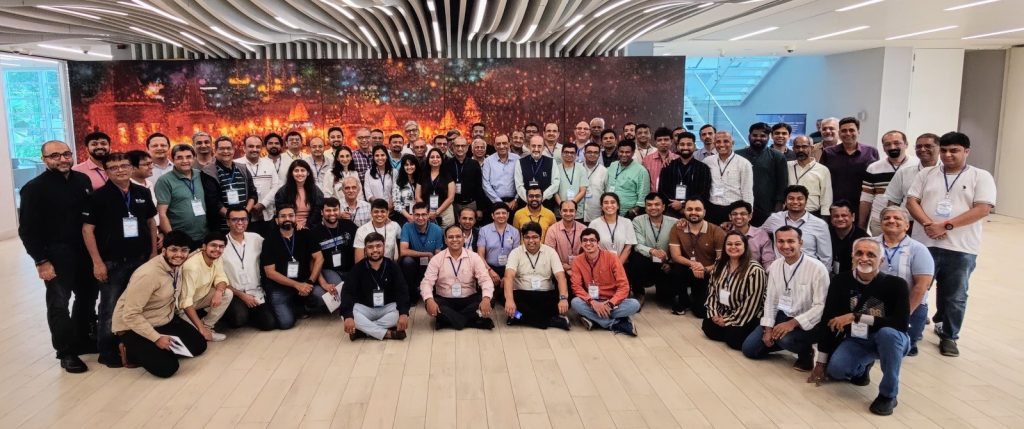
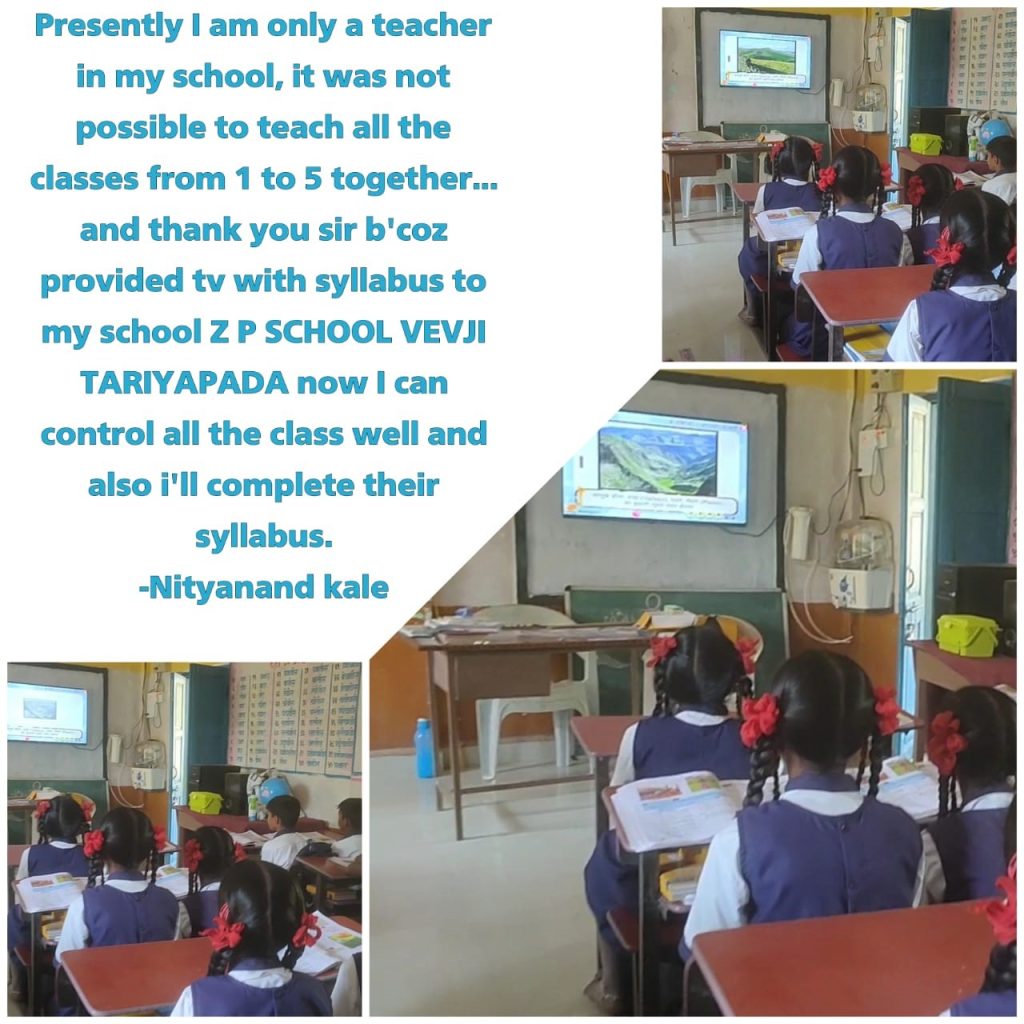
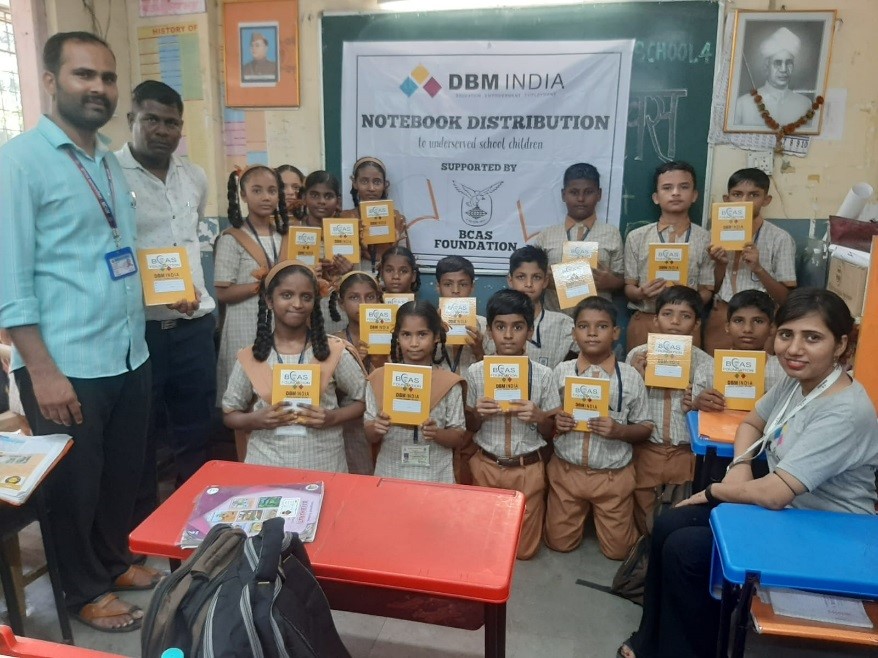

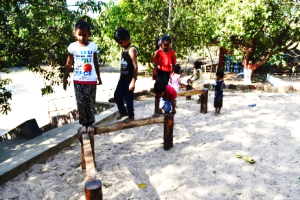




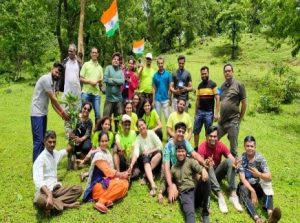
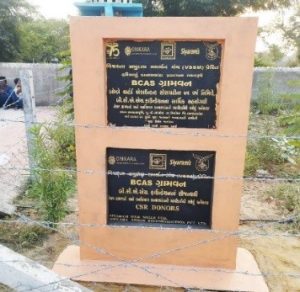
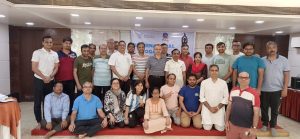
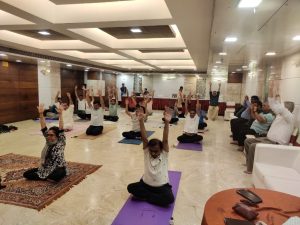











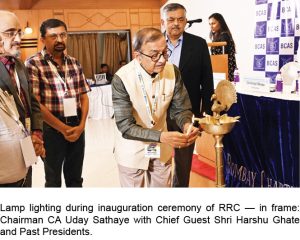
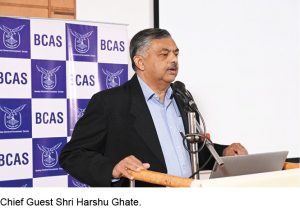
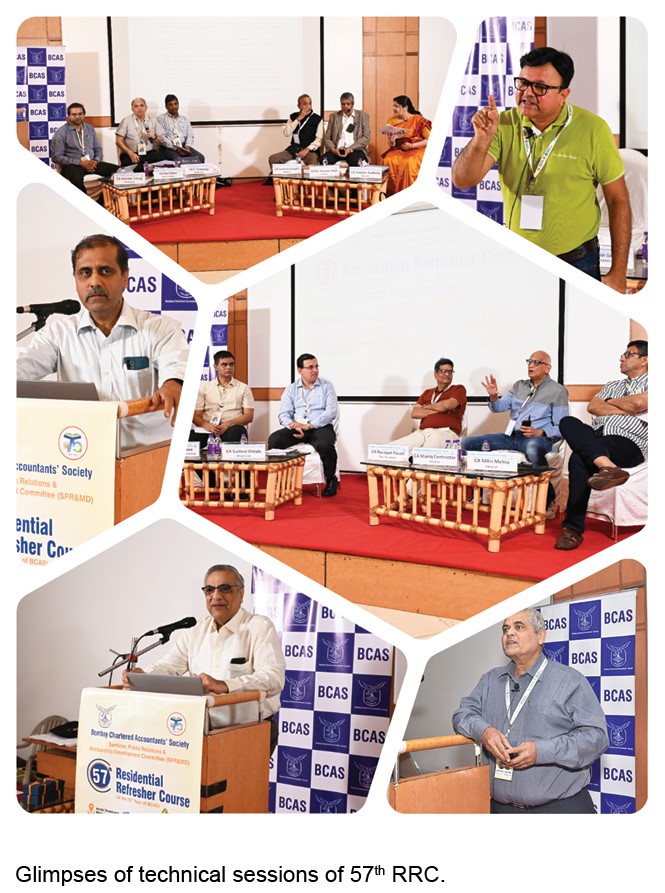
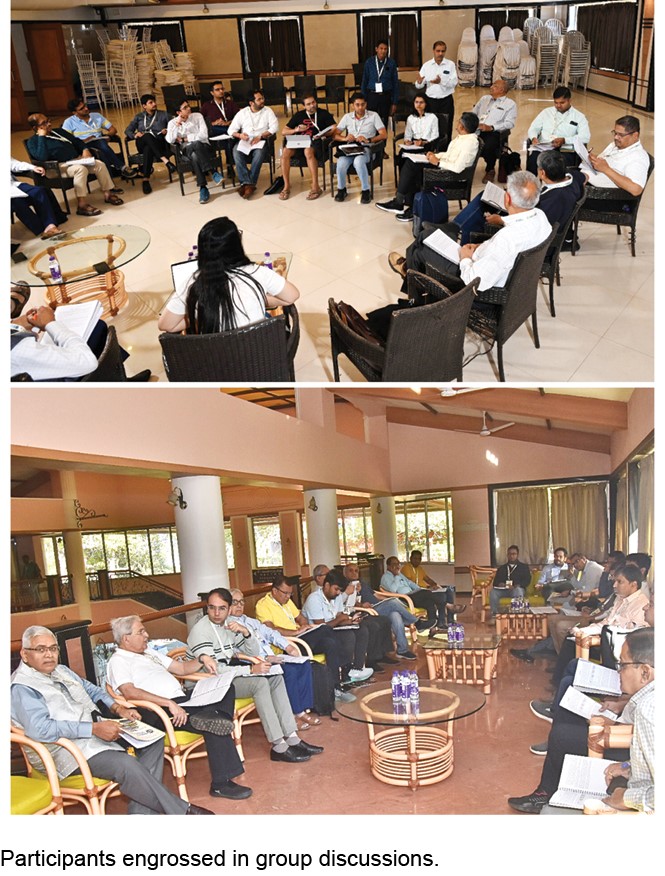
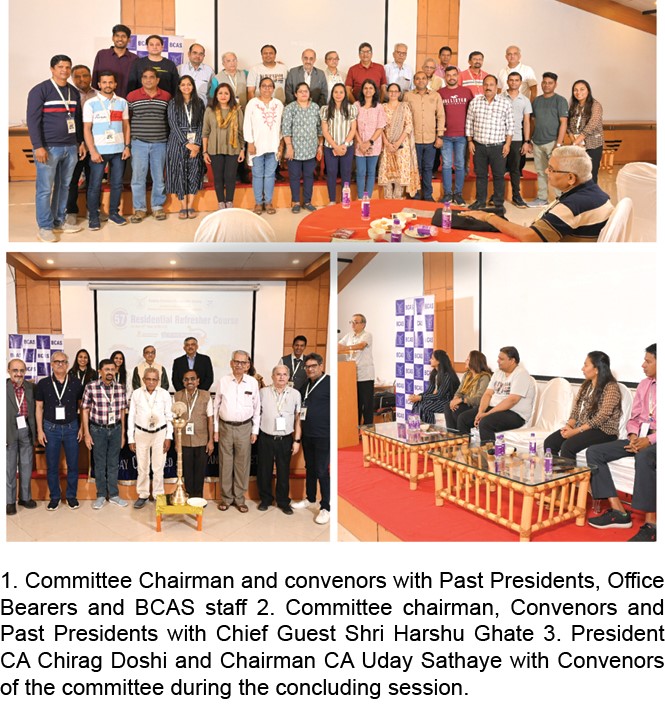
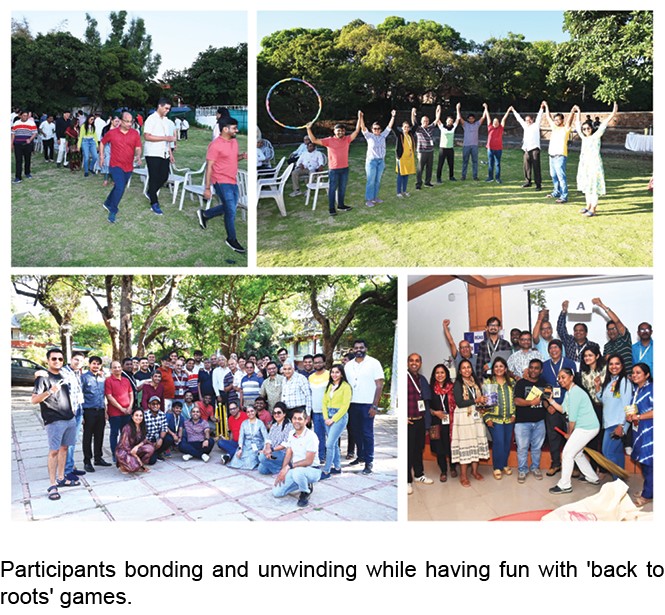
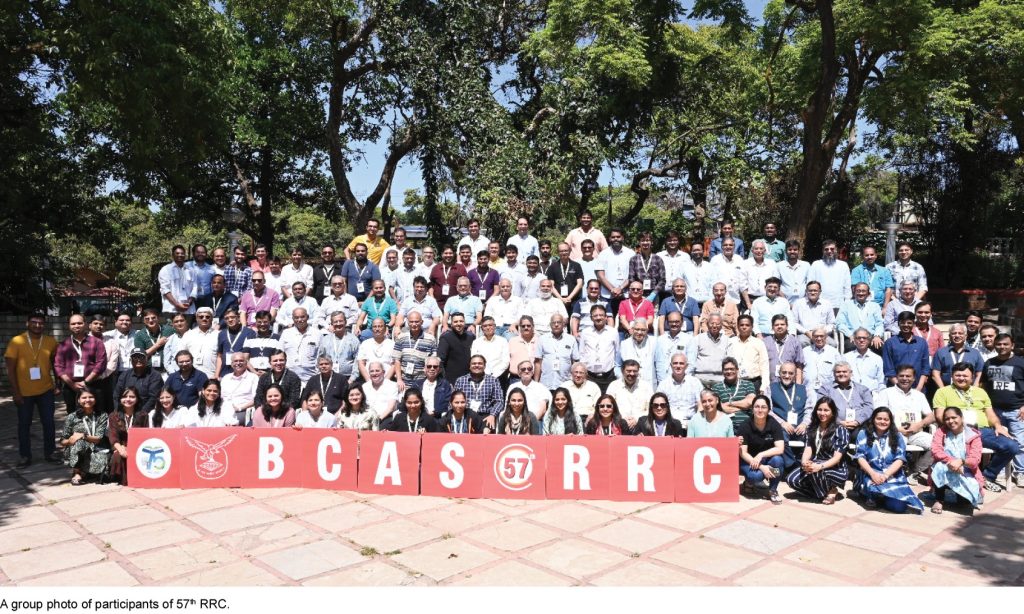
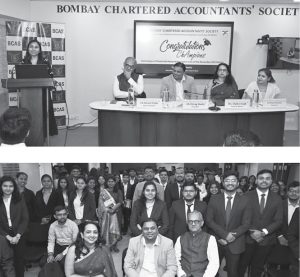
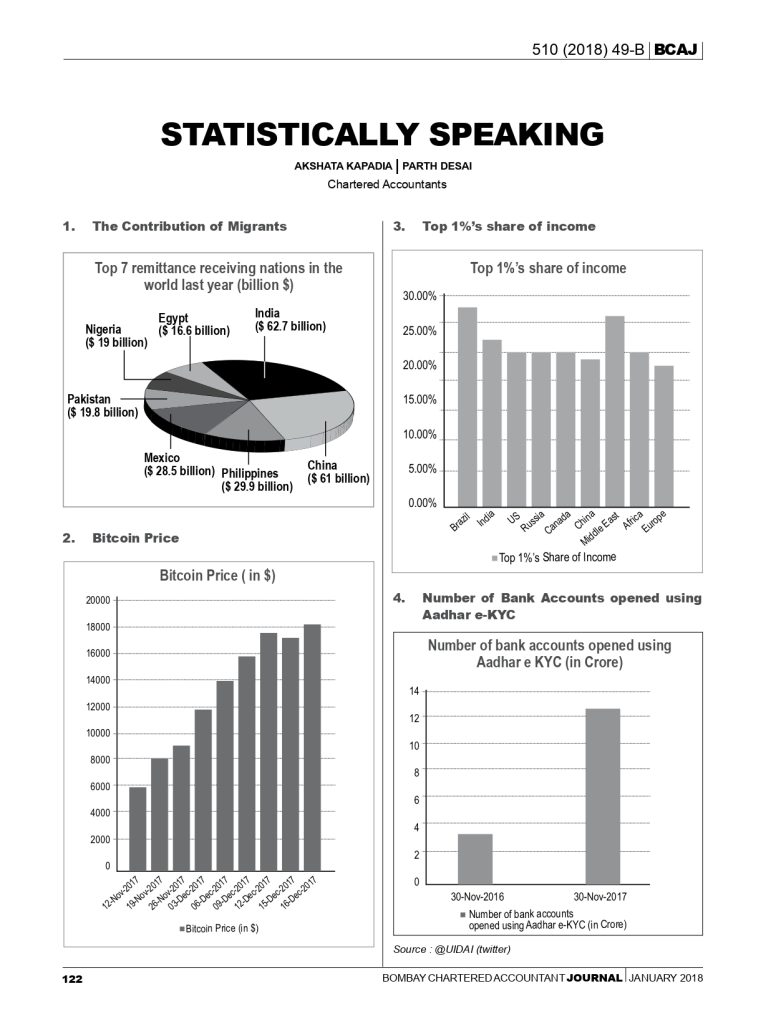
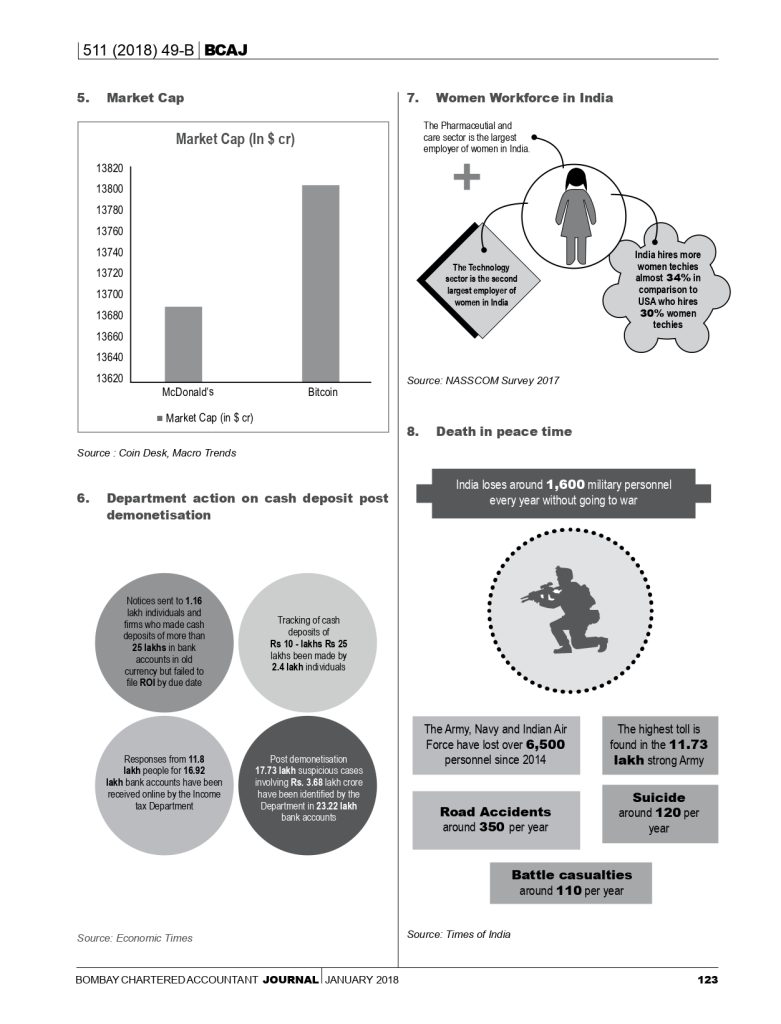












 The workshop held at the Palladium Hotel, Mumbai on August 7th and 8th,
The workshop held at the Palladium Hotel, Mumbai on August 7th and 8th, The Keynote Address at the Conference was given by Shri Sunandan
The Keynote Address at the Conference was given by Shri Sunandan 1. OVERSEAS FUNDS – TA X AND REGULATORY ASPECTS by Shri Bhavin Shah. He dealt with issues relating to taxation of overseas funds and structures for inbound investment by such funds. He also highlighted issues in respect of capital gains on indirect transfers, treaty residence, GAAR, etc. He also provided insights into normal structures of overseas funds.
1. OVERSEAS FUNDS – TA X AND REGULATORY ASPECTS by Shri Bhavin Shah. He dealt with issues relating to taxation of overseas funds and structures for inbound investment by such funds. He also highlighted issues in respect of capital gains on indirect transfers, treaty residence, GAAR, etc. He also provided insights into normal structures of overseas funds.  2. STRUCTURING OF EPC CONTRACTS – TA X & OTHER ISSUES by Shri H. Padamchand Khincha. He highlighted and exhaustively analysed the controversies and issues relating to taxation of various types of EPC contracts, including splitting up of such contracts, treatment of joint ventures, accrual and classification of income from such contracts.
2. STRUCTURING OF EPC CONTRACTS – TA X & OTHER ISSUES by Shri H. Padamchand Khincha. He highlighted and exhaustively analysed the controversies and issues relating to taxation of various types of EPC contracts, including splitting up of such contracts, treatment of joint ventures, accrual and classification of income from such contracts.  3. EXPATRIATE S – TAX AND REGULATORY ASPECTS by Shri Nikhil Bhatia. He analysed the various issues relating to taxation of expatriates, including determination of residential status, deductibility of social security contributions, and treatment of tax equalisation, and also discussed other provisions affecting expatriates, such as provident fund contribution, etc. This was supplemented by various Case Studies involving issues such as transfers, tax efficient method for such transfers, Indian Exchange Control Regulations, Tax Credits, etc.
3. EXPATRIATE S – TAX AND REGULATORY ASPECTS by Shri Nikhil Bhatia. He analysed the various issues relating to taxation of expatriates, including determination of residential status, deductibility of social security contributions, and treatment of tax equalisation, and also discussed other provisions affecting expatriates, such as provident fund contribution, etc. This was supplemented by various Case Studies involving issues such as transfers, tax efficient method for such transfers, Indian Exchange Control Regulations, Tax Credits, etc.  4. PLACE OF EFFECTIVE MANAGEMENT (POEM) by Shri Pinakin Desai, who analysed the meaning of the newly introduced term in the Indian context. He discussed the international perspective and earlier case laws on control and management, and the various factual aspects which would assist in determination of the POEM.
4. PLACE OF EFFECTIVE MANAGEMENT (POEM) by Shri Pinakin Desai, who analysed the meaning of the newly introduced term in the Indian context. He discussed the international perspective and earlier case laws on control and management, and the various factual aspects which would assist in determination of the POEM.  BASE EROSION AND PROFIT SHIFTING (BEPS) – RECENT DEVELOPMENTS by Shri T. P. Ostwal, who covered issues relating to recent developments internationally, and at the OECD. He explained the progress on each of the 15 action points under the BEPS initiative, and the expected timelines within which further actions were to be taken.
BASE EROSION AND PROFIT SHIFTING (BEPS) – RECENT DEVELOPMENTS by Shri T. P. Ostwal, who covered issues relating to recent developments internationally, and at the OECD. He explained the progress on each of the 15 action points under the BEPS initiative, and the expected timelines within which further actions were to be taken. 




























































 The speaker on the subject, Mr. Monish Chatrath gave the audience an overview of the latest developments under Companies Act, which place an onerous responsibility on the auditor. Emphasising their importance, he stressed upon the need to make IFC a powerful and practical tool, in the hands of all the stakeholders – the organisation, the consultant and the auditor.
The speaker on the subject, Mr. Monish Chatrath gave the audience an overview of the latest developments under Companies Act, which place an onerous responsibility on the auditor. Emphasising their importance, he stressed upon the need to make IFC a powerful and practical tool, in the hands of all the stakeholders – the organisation, the consultant and the auditor.  The speaker Mr. R. Ravichandran, Director of Income Tax (Intelligence & Criminal Investigation) explained in detail, the legal framework, procedures and issues involved in the use of Digital Evidence obtained by the Income Tax Department during various stages of assessments, search and seizures.
The speaker Mr. R. Ravichandran, Director of Income Tax (Intelligence & Criminal Investigation) explained in detail, the legal framework, procedures and issues involved in the use of Digital Evidence obtained by the Income Tax Department during various stages of assessments, search and seizures. One day Seminar on BEPS in Action was organised by the International Taxation Committee on 7th November, 2015 at Palladium Hotel in Mumbai.
One day Seminar on BEPS in Action was organised by the International Taxation Committee on 7th November, 2015 at Palladium Hotel in Mumbai.  The Seminar started with CA. Vishal Gada giving an overview of the final deliverables of the OECD on the 15 Action Plans on their Base Erosion and Profit Shifting (BEPS) Project. He gave a detailed summary of the Action Plans. Thereafter, he dealt with the Action Plan on addressing tax challenges in Digital Economy. He informed the audience about the various options that the OECD has suggested to deal with the lack of permanent establishment threshold and indirect taxes issues arising out of e-commerce transactions for source countries. He also summarised some global developments like unilateral actions by countries relating to BEPS during his talk.
The Seminar started with CA. Vishal Gada giving an overview of the final deliverables of the OECD on the 15 Action Plans on their Base Erosion and Profit Shifting (BEPS) Project. He gave a detailed summary of the Action Plans. Thereafter, he dealt with the Action Plan on addressing tax challenges in Digital Economy. He informed the audience about the various options that the OECD has suggested to deal with the lack of permanent establishment threshold and indirect taxes issues arising out of e-commerce transactions for source countries. He also summarised some global developments like unilateral actions by countries relating to BEPS during his talk.  In the subsequent session, action plans relating to substance issues arising in the transfer pricing field were taken up by CA. Sanjay Tolia. He dealt with value creation in case of intangibles, as regards risks and capital and high risk transactions. He also explained the new documentation requirement for country-by-country reporting with master file and country files.
In the subsequent session, action plans relating to substance issues arising in the transfer pricing field were taken up by CA. Sanjay Tolia. He dealt with value creation in case of intangibles, as regards risks and capital and high risk transactions. He also explained the new documentation requirement for country-by-country reporting with master file and country files.  Mr. S.P. Singh, IRS, dealt with the action plans dealing with the issues of transparency and certainty. These action plans related to establishing methodologies to collect and analyse data on BEPS, requiring taxpayers to disclose their aggressive tax planning arrangements, making Dispute Resolution mechanism more effective and developing a Multilateral Instrument to effectively implement the action plans.
Mr. S.P. Singh, IRS, dealt with the action plans dealing with the issues of transparency and certainty. These action plans related to establishing methodologies to collect and analyse data on BEPS, requiring taxpayers to disclose their aggressive tax planning arrangements, making Dispute Resolution mechanism more effective and developing a Multilateral Instrument to effectively implement the action plans.  In the final session, CA T. P. Ostwal updated the participants about the current developments like the ‘Google tax’ and reporting on aggressive planning techniques by taxpayers and other related developments in India and globally.
In the final session, CA T. P. Ostwal updated the participants about the current developments like the ‘Google tax’ and reporting on aggressive planning techniques by taxpayers and other related developments in India and globally.  The speaker, CA. Rohan Phatarphekar shared with the audience, his views on the recent development and controversies in Transfer Pricing. He gave a brief overview on the application and interpretation of these recent developments. He emphasised on the issues involved and the approach of the revenue for these controversies and discussed the same in details.
The speaker, CA. Rohan Phatarphekar shared with the audience, his views on the recent development and controversies in Transfer Pricing. He gave a brief overview on the application and interpretation of these recent developments. He emphasised on the issues involved and the approach of the revenue for these controversies and discussed the same in details.  A full day seminar on “Charitable Trusts” was organised jointly with The Chamber of Tax Consultants. The objective of the seminar was to enlighten the participants with the entire aspects and procedures for formation, running rules, regulations, investments and taxation of Charitable Trusts with special emphasis on the updated laws and CSR provisions.
A full day seminar on “Charitable Trusts” was organised jointly with The Chamber of Tax Consultants. The objective of the seminar was to enlighten the participants with the entire aspects and procedures for formation, running rules, regulations, investments and taxation of Charitable Trusts with special emphasis on the updated laws and CSR provisions. 




















 The faculty answered the various queries raised by the members which reflected how deeply the audience got interested on the subject. More than 200 members present gained immensely from the expert deliberation from the faculties. The video of the lecture is available at www.bcasonline.org & www.bcasonline.tv, respectively, for the benefit of all.
The faculty answered the various queries raised by the members which reflected how deeply the audience got interested on the subject. More than 200 members present gained immensely from the expert deliberation from the faculties. The video of the lecture is available at www.bcasonline.org & www.bcasonline.tv, respectively, for the benefit of all. 













 The Indirect Tax Committee of the Society conducted a workshop on 12th September 2015 on “How to assess the impact of proposed GST law” on two major business sectors. Mr. Divyesh Lapsiwala dealt with possible impact on pharmaceutical sector. He explained in a very lucid manner and citing various examples as to how the new concepts in GST are likely to impact business processes and distribution models of pharma companies. Parind Mehta demonstrated before members the likely impact of GST on construction sector by discussing a case study. Participants also discussed various legal issues which may crop up while solving the case study.
The Indirect Tax Committee of the Society conducted a workshop on 12th September 2015 on “How to assess the impact of proposed GST law” on two major business sectors. Mr. Divyesh Lapsiwala dealt with possible impact on pharmaceutical sector. He explained in a very lucid manner and citing various examples as to how the new concepts in GST are likely to impact business processes and distribution models of pharma companies. Parind Mehta demonstrated before members the likely impact of GST on construction sector by discussing a case study. Participants also discussed various legal issues which may crop up while solving the case study.  Mr. Yogesh Thar addressed the august gathering on “ICDS: Overview and Challenges in Application”. The highlights of his talk are summarised below:
Mr. Yogesh Thar addressed the august gathering on “ICDS: Overview and Challenges in Application”. The highlights of his talk are summarised below:

 Lecture Meeting on Important Income-tax Decisions of 2014 on 29th January 2015
Lecture Meeting on Important Income-tax Decisions of 2014 on 29th January 2015


 Programme on Real Estate Investment Trusts (REITs) & Infrastructure Investment Trusts (InvITs) on 7th February 2015
Programme on Real Estate Investment Trusts (REITs) & Infrastructure Investment Trusts (InvITs) on 7th February 2015

















 The Human Resources Committee of BCAS organised a workshop (spread over four Saturdays), under the auspices of Amita Memorial Trust, where the Trainer, Mr. Shyam Lata dealt with various aspects of enhancing public speaking, communication and interpersonal skills. These four sessions helped the participants overcome limiting inhibitions. He guided them to develop a compelling desire, not only to express one’s ideas but to do so with conviction and assertion. 27 participants attended the workshop. They immensely benefited from the training.
The Human Resources Committee of BCAS organised a workshop (spread over four Saturdays), under the auspices of Amita Memorial Trust, where the Trainer, Mr. Shyam Lata dealt with various aspects of enhancing public speaking, communication and interpersonal skills. These four sessions helped the participants overcome limiting inhibitions. He guided them to develop a compelling desire, not only to express one’s ideas but to do so with conviction and assertion. 27 participants attended the workshop. They immensely benefited from the training.































 ESI, Bonus & Gratuity Act, Shop and Establishment Act:-
ESI, Bonus & Gratuity Act, Shop and Establishment Act:- A
A
 The
The Every year, the most awaited event is the budget. What the Finance Minister unfolded on 29th February 2016 with respect to the direct tax provisions was covered in the Public Lecture Meeting held on 4th March 2016 by Senior Advocate Mr. S. E. Dastur. This was the 51st Budget Lecture Meeting of the Society and 28th year of address by Mr. S. E. Dastur. This year the Society has captured pre budget expectations and post budget inteviews from the stalwarts and the youth. Just before the lecture began, a series of views of various people on the budget were taken by Mr. Ameet Patel. All these videos are available on our website as well as Youtube channel and also on social media.
Every year, the most awaited event is the budget. What the Finance Minister unfolded on 29th February 2016 with respect to the direct tax provisions was covered in the Public Lecture Meeting held on 4th March 2016 by Senior Advocate Mr. S. E. Dastur. This was the 51st Budget Lecture Meeting of the Society and 28th year of address by Mr. S. E. Dastur. This year the Society has captured pre budget expectations and post budget inteviews from the stalwarts and the youth. Just before the lecture began, a series of views of various people on the budget were taken by Mr. Ameet Patel. All these videos are available on our website as well as Youtube channel and also on social media. President Raman Jokhakar welcomed the speaker, Senior Advocate Mr. Vikram Nankani, an eminent speaker on the subject to throw light on the amendments of the changes by the Finance bill 2016.The lecture meeting commenced with the launch of the new publication of the Society “Partnership Firms – Registration Procedure and Frequently Faced Issues with Registrar of Firms” by Mr. Uday Sathaye, Past President of the Society. The book was launched by the speaker Mr. Nankani.
President Raman Jokhakar welcomed the speaker, Senior Advocate Mr. Vikram Nankani, an eminent speaker on the subject to throw light on the amendments of the changes by the Finance bill 2016.The lecture meeting commenced with the launch of the new publication of the Society “Partnership Firms – Registration Procedure and Frequently Faced Issues with Registrar of Firms” by Mr. Uday Sathaye, Past President of the Society. The book was launched by the speaker Mr. Nankani.  Professionals like CA’s, Advocates, Businessmen are finding it difficult to Register Partnership Firms with Registrar of Firms in Maharashtra due to various issues. This process of registration involves submission of documents and the careful adherence to a procedure which has been laid down.
Professionals like CA’s, Advocates, Businessmen are finding it difficult to Register Partnership Firms with Registrar of Firms in Maharashtra due to various issues. This process of registration involves submission of documents and the careful adherence to a procedure which has been laid down. 
 His address was followed by the interactive session wherein the panel of RBI officers provided views on the written queries provided to them in advance. The queries covered all important areas of FEMA including those dealing with ODI, FDI, LRS, ECB and Trade transactions. The Officers answered the queries and also dealt with several questions from the audience.
His address was followed by the interactive session wherein the panel of RBI officers provided views on the written queries provided to them in advance. The queries covered all important areas of FEMA including those dealing with ODI, FDI, LRS, ECB and Trade transactions. The Officers answered the queries and also dealt with several questions from the audience. The post lunch technical sessions was on “Trade Transactions” by Mr. Shabbir Motorwala who succinctly covered the vast subject in the time available with him. The last session was on “ECBs” wherein Mr. Kumar Saurabh Singh covered the recent amendments in the ECB policy and also dealt with the other financing routes available to borrowers. Both the speakers answered queries from the audience and covered the subjects in significant detail. The Conference was received well by all present.
The post lunch technical sessions was on “Trade Transactions” by Mr. Shabbir Motorwala who succinctly covered the vast subject in the time available with him. The last session was on “ECBs” wherein Mr. Kumar Saurabh Singh covered the recent amendments in the ECB policy and also dealt with the other financing routes available to borrowers. Both the speakers answered queries from the audience and covered the subjects in significant detail. The Conference was received well by all present.  It was once again a proud moment for BCAS and BCAS Foundation to organise a music concert “Udat Abeel Gulal”, together with a few other organisations at Bharatiya Vidya Bhavan on 19th March, 2016 in aid of Dilasa Sanstha, an NGO engaged in relief work for drought affected farmers of Maharashtra. Attended by a large audience, it started with jugalbandi of Santoor and Saraswati Veena by Shri Snehal Muzoomdar, Maithili Muzoomdar on Santoor and Shri Narayan Mani on Saraswati Veena respectively, accompanied by a team of virtuoso musicians and interspersed with Vedic chants by Ved Pandit Dr. Narasimha Ghanpatigal. Explaining the theme “Bairagi se Basant”, Compere Mihir Sheth vividly created background atmosphere for celebration of spring with quotes from Kalidasa and Rig-Veda. Narrating the ethos of the theme and quoting medieval poet Maagh, he said when season of Basant arrives, its enchanting beauty feels us with a sense of bliss, Abeel and Gulal colour our lives, the fire of Holi protects our lives, give us the prosperity and hence, we all invoke Firegod Agni as narrated in Agnisooktam in Rig-Veda whose hymns are often chanted in raga Bairagi.
It was once again a proud moment for BCAS and BCAS Foundation to organise a music concert “Udat Abeel Gulal”, together with a few other organisations at Bharatiya Vidya Bhavan on 19th March, 2016 in aid of Dilasa Sanstha, an NGO engaged in relief work for drought affected farmers of Maharashtra. Attended by a large audience, it started with jugalbandi of Santoor and Saraswati Veena by Shri Snehal Muzoomdar, Maithili Muzoomdar on Santoor and Shri Narayan Mani on Saraswati Veena respectively, accompanied by a team of virtuoso musicians and interspersed with Vedic chants by Ved Pandit Dr. Narasimha Ghanpatigal. Explaining the theme “Bairagi se Basant”, Compere Mihir Sheth vividly created background atmosphere for celebration of spring with quotes from Kalidasa and Rig-Veda. Narrating the ethos of the theme and quoting medieval poet Maagh, he said when season of Basant arrives, its enchanting beauty feels us with a sense of bliss, Abeel and Gulal colour our lives, the fire of Holi protects our lives, give us the prosperity and hence, we all invoke Firegod Agni as narrated in Agnisooktam in Rig-Veda whose hymns are often chanted in raga Bairagi.  The Jugalbandi started with raga Bairagi rendered on Santoor and Saraswati Veena interspersed with chanting of Vedic hymns and then deftly moved on to raga Basant and Kafi, which are the popular ragas of the Basant season, accompanied by vocalists Shraddha Shridharni in Hindustani style and Nupur Joshi in Carnatic style. Both the vocalists recreated magic with their rendition of poet Nanhalal’s poems so ably composed by Snehal Muzoomdar. Fine balance of melodious music with perfect percussion and dramatic entry of vocalists on the stage left the audience completely mesmerised when it reached the crescendo in the end.
The Jugalbandi started with raga Bairagi rendered on Santoor and Saraswati Veena interspersed with chanting of Vedic hymns and then deftly moved on to raga Basant and Kafi, which are the popular ragas of the Basant season, accompanied by vocalists Shraddha Shridharni in Hindustani style and Nupur Joshi in Carnatic style. Both the vocalists recreated magic with their rendition of poet Nanhalal’s poems so ably composed by Snehal Muzoomdar. Fine balance of melodious music with perfect percussion and dramatic entry of vocalists on the stage left the audience completely mesmerised when it reached the crescendo in the end.  The Human Development & Technology Initiative Committee continued with the annual CSR activity of supporting Eye Camp for the tribals and the needy people from the rural area surrounding Vansda, Dist. Navsari.
The Human Development & Technology Initiative Committee continued with the annual CSR activity of supporting Eye Camp for the tribals and the needy people from the rural area surrounding Vansda, Dist. Navsari.  The Committee had set a target of one Eye Camp with a Budget of Rs.51,000/- for cataract surgery of 51 patients. However, with divine grace and kind support of all donor friends, it was able to collect Rs.2,17,200, which can take care of 217 patients i.e. little over four Eye Camps.
The Committee had set a target of one Eye Camp with a Budget of Rs.51,000/- for cataract surgery of 51 patients. However, with divine grace and kind support of all donor friends, it was able to collect Rs.2,17,200, which can take care of 217 patients i.e. little over four Eye Camps. 








 In the first session CA. Mayur Nayak effectively explained, many important points aptly punctuated with humour. He explained the importance of clarity of goal, attitude to win, discipline, consistency, effective time management and how to overcome distractions. He guided them to have Balanced food, effective study and relaxation. He emphasised that harmony of physical, emotional, intellectual and spiritual alignment would help them to face any challenges in life including that of exams.
In the first session CA. Mayur Nayak effectively explained, many important points aptly punctuated with humour. He explained the importance of clarity of goal, attitude to win, discipline, consistency, effective time management and how to overcome distractions. He guided them to have Balanced food, effective study and relaxation. He emphasised that harmony of physical, emotional, intellectual and spiritual alignment would help them to face any challenges in life including that of exams.  In the second session CA. Shrinivas Joshi focused on CA exams. He explained at length as to how to prepare with qualitative studies for exams including use of appropriate reference materials. He shared the information that excellent study materials and faculties are available freely to clarify and guide on a variety of subjects covered in the syllabus. He explained at length as to what the examiner expects from the students and also cleared their doubts on misinformation and wrong impressions in the minds of the students about the ICAI exams and its results. He shared the important tips as to how to write the papers and manage time of three hours in exams. He answered all questions raised by the students.
In the second session CA. Shrinivas Joshi focused on CA exams. He explained at length as to how to prepare with qualitative studies for exams including use of appropriate reference materials. He shared the information that excellent study materials and faculties are available freely to clarify and guide on a variety of subjects covered in the syllabus. He explained at length as to what the examiner expects from the students and also cleared their doubts on misinformation and wrong impressions in the minds of the students about the ICAI exams and its results. He shared the important tips as to how to write the papers and manage time of three hours in exams. He answered all questions raised by the students. 
 The Seminar on Media and Entertainment Industry was conducted by the International Taxation Committee of the BCAS on 12 February 2016 at St. Regis Hotel (Palladium Hotel). This seminar was organized jointly with Accounting & Auditing Committee and Indirect Taxation Committee. The speakers at the seminar and the topics covered were as under:
The Seminar on Media and Entertainment Industry was conducted by the International Taxation Committee of the BCAS on 12 February 2016 at St. Regis Hotel (Palladium Hotel). This seminar was organized jointly with Accounting & Auditing Committee and Indirect Taxation Committee. The speakers at the seminar and the topics covered were as under:  Mr. Jehil Thakkar on Know the industry – current issues – Business models, cash flows, vehicle for investments, etc. (Industry overview and typical situations)
Mr. Jehil Thakkar on Know the industry – current issues – Business models, cash flows, vehicle for investments, etc. (Industry overview and typical situations) Mr. Utkarsh Sanghvi on Indirect tax issues in media and entertainment industry, including: Service tax, VAT and customs.
Mr. Utkarsh Sanghvi on Indirect tax issues in media and entertainment industry, including: Service tax, VAT and customs.  The seminar was attended by more than 50 participants. The seminar became very informative and provided an overview of industry as a whole and detailed technical analysis on taxation, accounting and auditing aspects. The Seminar provided an insight into the industry and focused on the issues faced in the industry and the current trends in respect of the Media and Entertainment industry. The sessions at this seminar were all interactive and generated good amount of debate among the participants and the presenter.
The seminar was attended by more than 50 participants. The seminar became very informative and provided an overview of industry as a whole and detailed technical analysis on taxation, accounting and auditing aspects. The Seminar provided an insight into the industry and focused on the issues faced in the industry and the current trends in respect of the Media and Entertainment industry. The sessions at this seminar were all interactive and generated good amount of debate among the participants and the presenter.  Lecture Meeting on Important Case Laws of 2015 on Indirect Taxes held on Wednesday, 17th February 2016 at IMC Hall Churchgate Shri. K. Vaitheeswaran dealt with various important case laws of 2015 on Indirect Taxes. He discussed and deliberated upon case laws in the field of Central Excise, Customs, Service Tax and Sales tax. He dealt with intricacies of the cases with an impact analysis.
Lecture Meeting on Important Case Laws of 2015 on Indirect Taxes held on Wednesday, 17th February 2016 at IMC Hall Churchgate Shri. K. Vaitheeswaran dealt with various important case laws of 2015 on Indirect Taxes. He discussed and deliberated upon case laws in the field of Central Excise, Customs, Service Tax and Sales tax. He dealt with intricacies of the cases with an impact analysis.  Lecture Meeting on Important Income Tax Decisions of 2015 was held on Wednesday, 24th February 2016 at the Jaihind College Auditorium.
Lecture Meeting on Important Income Tax Decisions of 2015 was held on Wednesday, 24th February 2016 at the Jaihind College Auditorium. 

 The RSC started in the afternoon with group discussion on the paper titled “Case Studies on Taxation of Services” written by CA A. R. Krishnan. The group leaders were CA Ankit Joshi, CA Anil Kumar Beewada, CA Mandar Telang, CA Manindar Kakarla and CA Nilesh Suchak. Case Studies on taxability of different services and various “live” situations faced by tax advisers on daily basis were articulated. Valuation, Exemption, Point of Taxation and Place of Provision of Service were debated with active participation of all the delegates.
The RSC started in the afternoon with group discussion on the paper titled “Case Studies on Taxation of Services” written by CA A. R. Krishnan. The group leaders were CA Ankit Joshi, CA Anil Kumar Beewada, CA Mandar Telang, CA Manindar Kakarla and CA Nilesh Suchak. Case Studies on taxability of different services and various “live” situations faced by tax advisers on daily basis were articulated. Valuation, Exemption, Point of Taxation and Place of Provision of Service were debated with active participation of all the delegates.  The morning started with the group discussion on the paper “Case Studies on CENVAT Credit” written by CA S. S. Gupta. The group leaders were CA Ganesh Prabhu Balakumar, CA Keval Shah, CA Shreyas Sangoi, CA Shruti Kakaria and CA Vaibhav Jajoo. The issues were debated since most of the issues had a variety of angles involved and had day-today relevance.
The morning started with the group discussion on the paper “Case Studies on CENVAT Credit” written by CA S. S. Gupta. The group leaders were CA Ganesh Prabhu Balakumar, CA Keval Shah, CA Shreyas Sangoi, CA Shruti Kakaria and CA Vaibhav Jajoo. The issues were debated since most of the issues had a variety of angles involved and had day-today relevance.  The second technical session was a presentation paper by CA Divyesh Lapsiwala on “Indirect Tax Benefits in Foreign Trade Policy”. In his inimitable style, he briefly explained the five most common schemes of the Government’s Foreign Trade Policy which can benefit the exporters i.e. (a) Export Promotion Capital Goods Scheme (b) Services Exports from India Scheme (c) Status Holders (d) Software Technology Park Scheme and (e) Special Economic Zone Scheme. This session was chaired by CA Hasmukh Kamdar.
The second technical session was a presentation paper by CA Divyesh Lapsiwala on “Indirect Tax Benefits in Foreign Trade Policy”. In his inimitable style, he briefly explained the five most common schemes of the Government’s Foreign Trade Policy which can benefit the exporters i.e. (a) Export Promotion Capital Goods Scheme (b) Services Exports from India Scheme (c) Status Holders (d) Software Technology Park Scheme and (e) Special Economic Zone Scheme. This session was chaired by CA Hasmukh Kamdar.  The last paper for Group Discussion was written by by CA Parind Mehta on “Case Studies on Sale v/s Service – Composite Transactions (Taxability under VAT and Service Tax)”. The Group Leaders were CA Chirag Mehta, CA Samir Kapadia, CA Sanjay Dhariwal, CA Vikram Mehta and CA Yash Dhadda. The case studies highlighted certain very relevant issues which a transaction could have and were probably not even envisaged by many participants.
The last paper for Group Discussion was written by by CA Parind Mehta on “Case Studies on Sale v/s Service – Composite Transactions (Taxability under VAT and Service Tax)”. The Group Leaders were CA Chirag Mehta, CA Samir Kapadia, CA Sanjay Dhariwal, CA Vikram Mehta and CA Yash Dhadda. The case studies highlighted certain very relevant issues which a transaction could have and were probably not even envisaged by many participants.  During the fourth technical session, CA Sagar Shah presented a paper on “Role of CAs in GST – Realignment Requirements”. A very crisp and brief analysis of how as a professional we need to gear up for the challenges as well as opportunities this new law will generate for Chartered Accountants. This session was chaired by CA Sunil Gabhawalla.
During the fourth technical session, CA Sagar Shah presented a paper on “Role of CAs in GST – Realignment Requirements”. A very crisp and brief analysis of how as a professional we need to gear up for the challenges as well as opportunities this new law will generate for Chartered Accountants. This session was chaired by CA Sunil Gabhawalla.  BCAS organised a lecture meeting on 29-6-2016 on the Model GST Law at IMC. At a juncture when the fate of the 122nd Constitutional Amendment Bill is yet to be known and everyone is waiting for its passage in this monsoon session of the Parliament, on 14-06-02016, the Model GST Law was placed in the public domain by the government after the nod of the Empowered Committee. Shri Shailesh Sheth gave wonderful insights on the model law. The views of the speaker on the Model GST Law were commendable and a guiding force for all. The speaker in a nutshell described to the members present the various provisions of the model law and how the model law has been drafted as a mixture of the existing indirect tax laws like State Level VAT , Central Excise and Service tax. The meeting received an overwhelming response with the venue packed with around 250 audience.
BCAS organised a lecture meeting on 29-6-2016 on the Model GST Law at IMC. At a juncture when the fate of the 122nd Constitutional Amendment Bill is yet to be known and everyone is waiting for its passage in this monsoon session of the Parliament, on 14-06-02016, the Model GST Law was placed in the public domain by the government after the nod of the Empowered Committee. Shri Shailesh Sheth gave wonderful insights on the model law. The views of the speaker on the Model GST Law were commendable and a guiding force for all. The speaker in a nutshell described to the members present the various provisions of the model law and how the model law has been drafted as a mixture of the existing indirect tax laws like State Level VAT , Central Excise and Service tax. The meeting received an overwhelming response with the venue packed with around 250 audience.  Mr. Yogesh Thar explained the important features of The Direct Tax Dispute Resolution Scheme, 2016 and Equalisation Levy. . He further discussed the provisions related to special rate of tax for certain companies under Section 115BA and Section 115 BBDA dealing with additional 10% tax on dividends in the hands of recipient. He also brought out various issues arising out of the above amendments and answered the queries of the participants.
Mr. Yogesh Thar explained the important features of The Direct Tax Dispute Resolution Scheme, 2016 and Equalisation Levy. . He further discussed the provisions related to special rate of tax for certain companies under Section 115BA and Section 115 BBDA dealing with additional 10% tax on dividends in the hands of recipient. He also brought out various issues arising out of the above amendments and answered the queries of the participants. Mr. Rajesh Kadakia started his talk by highlighting the amendments relating to charitable institutions. He explained the intention and rationale behind the said changes and highlighted the effects of the same for the existing charitable institutions and their activities. He gave an insight into the provisions relating to Immovable Properties (Sec. 50C), Capital Gains related provisions and deduction of profits from housing projects of affordable residential units – Sec. 80IBA etc.
Mr. Rajesh Kadakia started his talk by highlighting the amendments relating to charitable institutions. He explained the intention and rationale behind the said changes and highlighted the effects of the same for the existing charitable institutions and their activities. He gave an insight into the provisions relating to Immovable Properties (Sec. 50C), Capital Gains related provisions and deduction of profits from housing projects of affordable residential units – Sec. 80IBA etc.  Mr. Praful Poladia started with case studies highlighting the amendments to Presumptive Taxation for persons engaged in business and profession and related provisions i.e. tax audit and maintenance of books of account. He also gave detailed examples in relation to amendments to buyback of shares and how it affects business structuring. He explained to the participants the new Income Declaration Scheme, 2016 and took them through three sets of clarifications issued by CBDT on the Scheme.
Mr. Praful Poladia started with case studies highlighting the amendments to Presumptive Taxation for persons engaged in business and profession and related provisions i.e. tax audit and maintenance of books of account. He also gave detailed examples in relation to amendments to buyback of shares and how it affects business structuring. He explained to the participants the new Income Declaration Scheme, 2016 and took them through three sets of clarifications issued by CBDT on the Scheme.  Ms. Sonalee Godbole gave a detailed presentation on amendments in relation to penalties (with special reference to sec. 270A), Chapter VI-A deductions, provisions relating to Income from Business & Profession (other than Presumptive Taxation), Income from Salary, Income from House Property and TDS provisions. The speaker touched upon a wide number of judgments during the course of her talk. She also answered all the questions raised by the participants.
Ms. Sonalee Godbole gave a detailed presentation on amendments in relation to penalties (with special reference to sec. 270A), Chapter VI-A deductions, provisions relating to Income from Business & Profession (other than Presumptive Taxation), Income from Salary, Income from House Property and TDS provisions. The speaker touched upon a wide number of judgments during the course of her talk. She also answered all the questions raised by the participants.  There was also a session on Income Declaration Scheme, 2016 where the Principal CCIT Mr D. S. Saksena along with Pr. CIT – 1 Mr. D.C. Patwari addressed the participants about the features and procedural aspects of the said Scheme. They also answered the queries raised by the participants and were receptive to the clarifications sought by them. They told that the issues where clarifications are necessary would be forwarded to the CBDT for further clarification. They also asked the participants to make their clients aware of the scheme and assured that the details provided by assesse under the scheme would be kept confidential. Mr Patwari also briefly spoke about the Dispute Resolution Scheme, 2016.
There was also a session on Income Declaration Scheme, 2016 where the Principal CCIT Mr D. S. Saksena along with Pr. CIT – 1 Mr. D.C. Patwari addressed the participants about the features and procedural aspects of the said Scheme. They also answered the queries raised by the participants and were receptive to the clarifications sought by them. They told that the issues where clarifications are necessary would be forwarded to the CBDT for further clarification. They also asked the participants to make their clients aware of the scheme and assured that the details provided by assesse under the scheme would be kept confidential. Mr Patwari also briefly spoke about the Dispute Resolution Scheme, 2016.  The sessions in the Seminar were very interactive and the speakers answered a lot of queries that were received from the participants. The participants benefited immensely with the interactive sessions and detailed discussions with the speakers and Income Tax Department Officials. The event saw attendance by over 100 participants.
The sessions in the Seminar were very interactive and the speakers answered a lot of queries that were received from the participants. The participants benefited immensely with the interactive sessions and detailed discussions with the speakers and Income Tax Department Officials. The event saw attendance by over 100 participants.  He explained that the growth both in business and profession has to result in profits for associates, shareholders and stakeholders. He gave examples as to how he faced the key challenges in achieving and sustaining growth in his company which filters from top to bottom.
He explained that the growth both in business and profession has to result in profits for associates, shareholders and stakeholders. He gave examples as to how he faced the key challenges in achieving and sustaining growth in his company which filters from top to bottom.  Further, the speaker took through the journey of Marico which was a family run business and how it was modelled to bring about value principles and policies to bring expansion and growth. He talked about his journey of culture building in the organization through involvement of its people and seeking commitment from them. He also emphasized the need of quarter to quarter performance to measure topline and bottomline growth.
Further, the speaker took through the journey of Marico which was a family run business and how it was modelled to bring about value principles and policies to bring expansion and growth. He talked about his journey of culture building in the organization through involvement of its people and seeking commitment from them. He also emphasized the need of quarter to quarter performance to measure topline and bottomline growth.  Lecture Meeting on Tax Issues in Business Re-organisation- LLP / Companies by Shri Pinakin Desai was held at IMC. President Chetan Shah gave the opening remarks.
Lecture Meeting on Tax Issues in Business Re-organisation- LLP / Companies by Shri Pinakin Desai was held at IMC. President Chetan Shah gave the opening remarks.  The Indirect Taxation Committee (IDTC) of BCAS organized a Workshop on Maharashtra VAT and CST, wherein two important subjects were discussed i.e. (1) “Preparation and filing of returns under the new automation process” and (2) “Maharashtra Settlement of Arrears in Dispute Scheme, 2016”. It was held on Saturday 16 July 2016, at the Conference Hall of BCAS.
The Indirect Taxation Committee (IDTC) of BCAS organized a Workshop on Maharashtra VAT and CST, wherein two important subjects were discussed i.e. (1) “Preparation and filing of returns under the new automation process” and (2) “Maharashtra Settlement of Arrears in Dispute Scheme, 2016”. It was held on Saturday 16 July 2016, at the Conference Hall of BCAS.  CA. Chetan Shah (President, BCAS) welcomed the participants and highlighted the relevance of the topic in view of the proposed ‘automation process’ and expected implementation of the GST in April 2017. CA. Govind Goyal (Chairman IDTC) briefly introduced the speakers and topics allocated to each speaker for discussion. Thereafter, the speakers were felicitated by the CA. Deepak Shah, (Co- Chairman IDTC).
CA. Chetan Shah (President, BCAS) welcomed the participants and highlighted the relevance of the topic in view of the proposed ‘automation process’ and expected implementation of the GST in April 2017. CA. Govind Goyal (Chairman IDTC) briefly introduced the speakers and topics allocated to each speaker for discussion. Thereafter, the speakers were felicitated by the CA. Deepak Shah, (Co- Chairman IDTC).  The second session was led by Mr. A S Gorde. He gave a comprehensive presentation on the nitty-gritties of Maharashtra Settlement of Arrears Scheme and key aspects of process related to settlement and related issues. In the ensuing interaction, the speakers gladly addressed the queries raised by the participants. CA Kiran Garkar and CA Samir Kapadia were the moderators.
The second session was led by Mr. A S Gorde. He gave a comprehensive presentation on the nitty-gritties of Maharashtra Settlement of Arrears Scheme and key aspects of process related to settlement and related issues. In the ensuing interaction, the speakers gladly addressed the queries raised by the participants. CA Kiran Garkar and CA Samir Kapadia were the moderators.  In his closing remarks, CA. Govind Goyal appreciated the efforts made by the tax team and acknowledged their willingness and address all the queries raised on the floor. The workshop was attended by more than 110 participants.
In his closing remarks, CA. Govind Goyal appreciated the efforts made by the tax team and acknowledged their willingness and address all the queries raised on the floor. The workshop was attended by more than 110 participants. 












 The speaker CA. Khushroo B. Panthaky shared his knowledge and practical experience. Various regulatory issue, intricacies of reporting requirements and expectations from auditors and preparers of financial statements were well covered and explained to the attendees by way of practical examples, well designed to understand the complexities of the regulatory issues in a simplest way. He talked on various aspects of audit and how it has moved from a sampling certification to a risk based confirmation. He highlighted the significance of thorough checks, Study of client business end to end, what precautions an auditor needs to take up right from accepting the audit assignment till the final signing of the report.
The speaker CA. Khushroo B. Panthaky shared his knowledge and practical experience. Various regulatory issue, intricacies of reporting requirements and expectations from auditors and preparers of financial statements were well covered and explained to the attendees by way of practical examples, well designed to understand the complexities of the regulatory issues in a simplest way. He talked on various aspects of audit and how it has moved from a sampling certification to a risk based confirmation. He highlighted the significance of thorough checks, Study of client business end to end, what precautions an auditor needs to take up right from accepting the audit assignment till the final signing of the report. 
















































 Students Committee performing the flash mob
Students Committee performing the flash mob





 It was also discussed how we can prioritize the different aspects of our life like Financial, Professional, Social, Personal, Physical, Spiritual and bring harmony and purpose in our life, while we grow as well as be happy all the time. The presenter taught how to overcome distractions in the way of accomplishments and retain the mindset to focus.
It was also discussed how we can prioritize the different aspects of our life like Financial, Professional, Social, Personal, Physical, Spiritual and bring harmony and purpose in our life, while we grow as well as be happy all the time. The presenter taught how to overcome distractions in the way of accomplishments and retain the mindset to focus.  This meeting was conceived by the Corporate and Allied Laws Committee of BCAS and was jointly organized with the BSE. Mr. Neeraj Kulshrestha (Chief of Business Operations – BSE) was the Guest of Honour, Mr. Ajay Thakur (Head – BSE SME) was the keynote speaker and Mr. Mahavir Lunawat, (Founder – Pantomath Group) was the speaker for the day. Mr. Kanu Chokshi (Chairman, Corporate & Allied Laws Committee) chaired the meeting. Mr. Raman Jokhakar (President, BCAS) welcomed the participants and highlighted the relevance of the topic in view of the proposed ‘Startup India’ and ‘Standup India’ initiatives, launched by the Government of India. Mr. Kanu Chokshi briefly introduced the speakers and the topic.
This meeting was conceived by the Corporate and Allied Laws Committee of BCAS and was jointly organized with the BSE. Mr. Neeraj Kulshrestha (Chief of Business Operations – BSE) was the Guest of Honour, Mr. Ajay Thakur (Head – BSE SME) was the keynote speaker and Mr. Mahavir Lunawat, (Founder – Pantomath Group) was the speaker for the day. Mr. Kanu Chokshi (Chairman, Corporate & Allied Laws Committee) chaired the meeting. Mr. Raman Jokhakar (President, BCAS) welcomed the participants and highlighted the relevance of the topic in view of the proposed ‘Startup India’ and ‘Standup India’ initiatives, launched by the Government of India. Mr. Kanu Chokshi briefly introduced the speakers and the topic. Moving to the product zone, the team saw samples of each product processed out of the refinery, namely Propylene, Naptha, Gassoline, Jet/Aviation Turbine Fuel, Sulphur, Petcock etc. Participants were fortunate to visit control room. The entire refinery is controlled from this area. The control room has earmarked the area for each unit – Fluid catalytic cracking unit (FCCU), clean fuel plant (CFP), Hydrogen manufacturing unit (HMU), Reliance tank farm (RTF ) and so on.
Moving to the product zone, the team saw samples of each product processed out of the refinery, namely Propylene, Naptha, Gassoline, Jet/Aviation Turbine Fuel, Sulphur, Petcock etc. Participants were fortunate to visit control room. The entire refinery is controlled from this area. The control room has earmarked the area for each unit – Fluid catalytic cracking unit (FCCU), clean fuel plant (CFP), Hydrogen manufacturing unit (HMU), Reliance tank farm (RTF ) and so on. 